

Clinical Developmental Psychology
The Clinical Developmental (CD) Area offers opportunities to engage in research spanning infancy through to emerging adulthood related to clinically-relevant topics in typical and atypical development, psychosocial development, neuropsychology, therapy outcomes, and program evaluation.

Research programs studied by CD faculty have a developmental emphasis and include topics defined by:
- Age and stage of development (e.g., infancy, adolescence, transition to adulthood)
- Clinical psychopathology and treatment approach (e.g., trauma therapy, pain assessment, parenting, CBT, attachment disorders, early intensive behavioural intervention)
- Developmental cognitive neuroscience (e.g., memory, executive functioning, attention, brain structure-function relationships in clinical populations)
- Professional function related to children and families (e.g., clinical assessment/diagnosis, pediatric neuropsychological assessment, program evaluation)
- Child and youth clinical populations (including, but not limited to, Autism Spectrum Disorder, ADHD, developmental disabilities, learning disabilities, mental health, addictions)
- Developmental risk factors (e.g. prenatal exposures, trauma, brain injuries)
Faculty members in the CD area are all registered psychologists. Most members are active clinically—providing supervision, consultation, program evaluation, and outcome research in various community settings in addition to conducting collaborative grant-supported research.
In addition to obtaining rigorous research training, students are expected to obtain core competencies in the scope of practice of clinical psychology as applied to children and adolescents. This includes coursework and practical training (mainly in external practica) in psychological assessment and diagnosis of children and adolescents (including various types of internalizing disorders, externalizing disorders and developmental disorders), as well as, a variety of evidence-based modalities of child, adolescent, and/or family intervention.
For more information about the Clinical-Developmental area, please contact the Director of Clinical Training Dr. Adrienne Perry . For admissions queries, please review sections below.
- CD Area Program Requirements (.pdf)
- CD Program Handbook (.pdf)
Additional Program Information
Faculty Member
- Aitken, Madison
- Muir, Nicole M. (Métis) [Dr. Muir encourages Indigenous students to apply]
- Pillai Riddell, Rebecca
- Rawana, Jennine
- Till, Christine
- Toplak, Maggie E
- Weiss, Jonathan
- Bebko, James M
- Bohr, Yvonne M
- Connolly, Jennifer A
- Desrocher, Mary E
- Muller, Robert Tom
- Pepler, Debra J
- Perry, Adrienne
- Prime, Heather
- Wojtowicz, Magdalena
Psychology Research Labs
The CD Program’s mission is to prepare students for their roles and responsibilities as competent and ethical Clinical Developmental scientist-practitioners. We are committed to this goal by providing education and training in theoretical, scientific, and conceptual foundations of the discipline of Psychology. We believe that the practice of clinical psychology requires a strong scientific and research foundation that promotes the development of scientific knowledge and critical thinking. In our program, we strive to provide students with opportunities to engage in research related to clinically relevant topics in typical and atypical development spanning infancy through to emerging adulthood, neuropsychology, therapy outcomes, and program evaluation. These opportunities enable students to develop independence as scholars and to contribute to the creation and dissemination of knowledge to the discipline of psychology. Our program also has a strong emphasis on diversity, in that students are trained to be sensitive to individual differences and cultural diversity issues in approaching research and clinical issues. Students are expected to obtain core competency in all areas of the Mutual Recognition Agreement and be appropriately qualified for registration with the College of Psychologists of Ontario (or other licensing body elsewhere) for the practice of clinical psychology as applied to children and adolescents.
Program Goals
Overarching goals for graduates of our program and more general objectives are outlined here and these are further operationalized in Table 15:
- Graduates will demonstrate excellence in research, including: • competence in conceptualization and critical evaluation regarding research issues and appropriate use of statistics • competence in various research and evaluation methodologies suitable for typical and atypical populations in various settings (clinical, community, academic) • competence in the dissemination of research to diverse audiences (academic publications, presentations of professional associations, knowledge translation to broad audiences)
- Graduates will demonstrate clinical competence in assessment/diagnosis, according to accreditation and registration standards, including: • competence in psychoeducational and social-emotional assessment of children and adolescents • competence in the diagnostic formulation of various child and adolescent disorders and disabilities • competence in communicating diagnoses sensitively and with precision to children, adolescents, and their families • beginning competence in the supervision of assessments by more junior trainees
- Graduates will demonstrate clinical competence in evidence-based psychological interventions, according to accreditation and registration standards, including: • competence in core clinical skills in interpersonal relationships, such as forming a therapeutic alliance • competence in multiple modalities of evidence-based intervention for children, adolescents, and their parents • some students may gain competence in delivering group interventions, family therapy, parent-training interventions, and so on depending on the opportunities in their practicum settings
- Graduates will be ethical and professional members of the profession of psychology, including: • articulating a professional identity as clinical psychologists and scientist-practitioners • maintaining high standards of ethical and professional behaviour • demonstrating good self-awareness, self-evaluation, and knowledge of strengths and limits • demonstrating a sense of citizenship regarding contributing to the profession
- Graduates will demonstrate sensitivity to individual differences and cultural diversity in approaching research and clinical issues: • maintaining an attitude of respect and cultural humility regarding the impact of individual, cultural, and other forms of diversity in clients, and of their own position of privilege • commitment to working with and responding appropriately to marginalized or neglected groups of people
Admission Requirements for students applying for a Masters of Arts (MA)
- Minimum A- GPA in last two years of a four-year undergraduate honours degree (or equivalent) in Psychology (or Psychology Major); Applicants with an average that is lower than an A- (but minimum B+) may still apply; however, an explanation for why the average is low should be provided in “other information section” of the Supplemental Form.
- Completion of an undergraduate thesis or thesis equivalent;
- At least two courses in statistics and/or research methods with a minimum grade of A- in each course;
- Minimum of 6 months of research experience;
- Minimum of 6 months of volunteer or paid work in a clinical or related field;
- At least two letters of recommendation from a research or academic supervisor
In addition to meeting the graduate admission requirements, a student can only be admitted if there is a faculty member available and interested in serving as the applicant’s supervisor. For this reason, applicants are strongly encouraged to determine whether a faculty member with compatible research interests is available for supervision.
Students who plan to limit their studies to the Masters of Arts (MA) degree in the CD Area are discouraged from applying to the program. MA students in our graduate program are expected to proceed to and complete the requirements for the PhD degree. However, students completing their MA at York are not automatically accepted into the PhD program; they must make a formal, but internal, application for advancement into the PhD program.
Admission Requirements for students applying for a Doctor of Philosophy (PhD)
Admission to the CD area is generally at the MA level unless the applicant is from another CPA/APA-accredited clinical graduate program . In this circumstance, the applicant may be considered for admission to the PhD level. Students with a Master’s degree from a non-accredited graduate program (e.g. Experimental Psychology) will be considered for MA-level entry to the CD area. These students will be expected to complete an MA thesis and the core CD area courses to obtain an MA degree at York University, prior to entry into the PhD program. Students with a former Master’s degree may be exempt from some courses (e.g. statistics) if they declare competence in a particular area from a previous graduate course taken.
Applicants who wish to be considered for admission to the CD Area must specify “Clinical Developmental” as their primary area of interest on the Supplemental Form. Other areas in the Department of Psychology (e.g. Clinical) can be specified as a secondary area of interest. However, an applicant's file is not automatically forwarded to another area unless arranged by the applicant or the file is forwarded by the CD area. Once admitted, shifting from one area to another is not normally permitted.
It is strongly recommended that you contact potential faculty members to see if they are available to supervise a graduate student prior to listing them as potential supervisors in your Personal Statement. See our Faculty Directory to learn more about faculty members’ research interests. Make sure to list the names of CD faculty you are interested in working with on the Supplemental Form.
Students who are interested in specialized training in clinical neuropsychology can apply to the Clinical Neuropsychology stream after being admitted to the CD area. Please indicate in your Personal Statement if you plan to apply to the Clinical Neuropsychology stream.
Non-refundable application fee (paid online) OR Credit Card information submitted with the application. If you do not have a credit card and/or cannot apply online, you can request a hard-copy application form by calling 416-736-5000.
Documents needed to apply:
- Letters of Recommendation . A minimum of two letters of recommendation are required, but an additional third letter is preferred. It is ideal if two of your references are from a research/academic source, while the third is from a clinical supervisor familiar with your abilities. Academic references are very important, and having one strong clinical reference that attests to your professionalism and interpersonal skill can be advantageous.
- Transcripts from each post-secondary institution attended . When applying, unofficial transcripts are acceptable. If you are made an Offer of Admission, you will be required to provide official transcripts as a condition of admission. Transcripts are considered official when sent directly from the issuing institution(s) in unopened, sealed envelopes. In some instances, the issuing institution(s) may mail the transcripts to you in unopened, sealed envelopes to submit.
- PART A should (1) Describe your past training experiences and what makes you ready for intensive research and clinical training at the graduate level; (2) describe what motivates and/or inspires you, as it relates to your current research interests/specific supervisor, the CD program, and your broader career goals; (3) highlight your most important scholarly contribution/product or knowledge mobilization activity (e.g., thesis, poster presentation at a conference, presentation).
- PART B should describe how you/will you consider diversity, equity, and inclusion in your clinical and research endeavours? You can use personal experience or learning to highlight this.
- Curriculum Vitae. Make sure to indicate your educational and relevant employment history, any honours or scholarships you have received, any posters or publications you have been involved in, and relevant clinical volunteer experiences. We recommend that you take a look at samples of how academic curriculum vitae are organized to format your CV effectively. At the same time, there is no one specific format required.
For International Students
- Official Degree Certificate in countries where Degree Certificates are issued separately (i.e. Bangladesh, China, India, Iran, Pakistan etc.). Official copies MUST be submitted. Applicants should check International Credentials on the following website: futurestudents.yorku.ca/graduate/equivalency .
- Test of English as a Foreign Language (TOEFL) score , if English was not the language of instruction for your undergraduate degree. Applicants are required to provide proof of language proficiency if their first language is not English or they have not completed at least one year of full-time study at an accredited university in a country (or institution) where English is the official language of instruction. York reserves the right to request a successful English language proficiency test result.
Review our Tips to Improve Your Application (below).
Submitting your Application
Apply online yorku.ca/gradstudies/psychology/future-students/how-to-apply/ to the Faculty of Graduate Studies to submit your full application.
If your application package does not contain all the required documents, your file may not get to the Psychology department. As a result, a review of your application by the professor you are interested in working with may be delayed.
If you have questions regarding the application process, please contact the Graduate Psychology Program at [email protected] .
Clinical psychology training programs in Canada recognize their shared responsibility to Indigenous peoples. The admissions process for entry into the Clinical and Clinical Developmental Programs at York University is committed to responding to the Truth and Reconciliation Commission of Canada: Calls to Action. With an understanding that Indigenous learners can face specific barriers or challenges when pursuing higher education, schools and programs within our Clinical and Clinical Developmental Programs have facilitated admission streams for applicants with Indigenous North American (First Nation, Inuit or Métis) ancestry. This process is intended to provide equitable access to Indigenous applicants and aligns with the intent of the Truth and Reconciliation Commission of Canada: Calls to Action.
The Department receives between 120–150 applications for admission to the CD area each year; approximately 8 students may be admitted per year. Preference is given to applicants with strong academic backgrounds who appear promising as researchers and as scientist-practitioners. Here are some common elements of successful applicants:
- They have applied for or have a history of external scholarship funding . We strongly recommend that you apply for external scholarship funding (e.g., Ontario Graduate Scholarship and one of the Tri-Council funding agencies [CIHR, SSHRC, NSERC]) before starting graduate school, even though you may not know what you will be doing for your Master’s research. Make sure to mention any submitted funding applications in your Statement of Interest!
- They have contacted faculty members before applying . Let faculty members know you intend on applying, and why you think you are a good fit to work with them in their program of research. Faculty members may not respond – however, even knowing you are applying can help them keep an eye out for your application.
- They specify whom they wish to work with. It is certainly acceptable to mention a number of faculty members (not just one), as this will increase your likelihood of being reviewed by a faculty member who will be taking a new graduate student (not every faculty member takes on a student every year). At the same time, being too broad in your research interests and in the number of faculty members whom you wish to work with makes it difficult for the review committee to know whom to direct your application to.
- Prior experience is an asset. Students have a history of presenting or publishing research during their undergraduate program/years, have high grades and have clinical and research experience that is linked to the field of research of their potential supervisor. They often volunteer in research labs beyond what is required in doing an undergraduate thesis, and have life experiences that demonstrate maturity, interpersonal competence, initiative, and responsibility.
- Students have excellent letters of reference. We recommend obtaining three letters of reference if possible. It is important that the referees know you well enough to answer the questions in the referral form. As a general rule, however, two strong references are better than three mediocre references. Referees can be from research or clinical fields, and a mix of both can be helpful. You should definitely include your undergraduate thesis supervisor as a reference.
Our Graduate Program in Clinical Developmental Psychology is accredited by the Canadian Psychological Association (CPA). Our last accreditation review occurred in 2022-23 and was renewed for a 6-year term. Also, please note that a program must be accredited at the time the student completes the program in order for the student to be able to declare that he/she graduated from an accredited program. If you have any questions or concerns about the accreditation status of our program, please contact the Director of Clinical Training Dr. Adrienne Perry .
- Public Disclosure Tables, 2022 (.pdf)
Dr. Stewart Madon Registrar, Accreditation Panel Canadian Psychological Association, Accreditation Office 141 Laurier Ave. W., Suite 702 Ottawa, Ontario K1P 5J3
Tel: 1-888-472-0657 (ext. 328 for administrative assistant) Email: [email protected] Website: Canadian Psychological Association
Useful Internal Websites
- York University Psychology Clinic (YUPC) - YUPC is a new, state-of-the-art community mental health and training centre associated with the Department of Psychology in the Faculty of Health at York University. The clinic provides a range of leading-edge, effective mental health services to keep people of all ages living healthy, productive lives.
- York Libraries
- Psychology Graduate Student Association - All graduate students in the Department of Psychology are automatically members of the PGSA.
Pre-Doctoral Internship Resources
- Association of Psychology Postdoctoral and Internship Centers - APPIC has organized and coordinated the internship matching process since 1968 by organizing and identifying quality internships.
- Time2Track - Time2Track is a web-based solution developed to help psychology graduate students track clinical training experiences for practica, internship, and licensure.
Professional Associations
- Canadian Psychology Association
- The College of Psychologists of Ontario
- Ontario Psychological Association

The Graduate Program in Psychology at York is an exciting environment to pursue innovative, socially engaging, career-ready education. Contact our Graduate Program Assistant to learn more.
Connect with Psychology
College of Education and Human Development
Institute of Child Development
Developmental psychology PhD
For us, community is a key word. At the Institute of Child Development (ICD), you'll join a close-knit group of faculty, staff, and peers who are driven to make a difference and who will support you as you grow as an academic and researcher. For more than 90 years, our faculty and students have worked together to make discoveries that increase knowledge about human development and improve lives.
In our program, you'll not only study what you love, but also develop the skills needed to teach others and translate science into practical solutions for children, youth, and families.
The structure of our program reflects our community-based philosophy. We offer guaranteed full funding for five academic years and embrace an academic community mentorship model, which means that students apply to our department instead of to work with a particular faculty member. As an ICD student, you'll be free to explore different topics in the field of developmental psychology and to follow your research and academic interests, no matter where they lead you.
Find what drives you – join us!
- Study with award-winning faculty , who are leaders in the field of developmental psychology.
- Receive guaranteed financial support for five academic years.
- Choose to pursue either our developmental science or developmental psychopathology and clinical science track.
- Join a close-knit community of scholars who are dedicated to understanding and supporting how children learn and grow.
- Earn your PhD at a top public research university located in an urban center, offering diverse opportunities for interdisciplinary and community-based research.
developmental psychology program in the nation
Source: Ranked in 2022 by U.S. News and World Report
Developmental science track
Interested in conducting research or teaching in the field of developmental psychology? Look no further. In our developmental science track, you can explore your research interests and gain the classroom experience needed for a career in research or academia.
As a developmental science student, you'll study human development across the lifespan and build your expertise in an area of research. Conduct research on topics including cognitive development, language development, executive function, social-emotional development, or neuroscience. If your interests span across topics, choose a research focus that's unique to you and work in collaboration with multiple Institute of Child Development (ICD) faculty members.
Continue building your resume by taking electives or declaring a doctoral minor. You’ll also have the opportunity to pursue interdisciplinary research with experts from across the University of Minnesota (U of M), a top public research university.
The developmental science track takes five years to complete.
Our curriculum is structured to support you as you grow as an academic and researcher. You'll build your expertise, explore your interests, and acquire the skills needed to be a leader in higher education or research settings. The developmental science track takes five years to complete.
Take foundational courses in cognitive, social-emotional, and biological development processes, ethical conduct of research, and statistical methods. Begin conducting research and identifying your area of specialty. Work with faculty to learn how to craft competitive fellowship applications.
Take advanced developmental psychology courses and choose special topics courses that interest you. Continue to deepen your research interests and learn how to effectively disseminate research information by presenting your first-year research project to the ICD community.
Hone your teaching skills by developing and teaching your own section of Introduction to Child Development. Continue working with faculty members to define your research expertise and prepare your prelim and final dissertation defense.
Developmental psychopathology and clinical science track
Blend research and clinical practice. In our developmental psychopathology and clinical science track, you'll study psychopathology in the context of development, build a foundation in developmental research, and gain the skills necessary to become a licensed clinician. You'll take developmental psychology courses with your cohort at the Institute of Child Development (ICD), as well as clinical training courses in the Department of Psychology. In addition to coursework in developmental and clinical psychology, you'll complete clinical practicums and a year-long internship. You'll also receive APA-accredited clinical training through the University of Minnesota Department of Psychology .
The clinical science track takes six years to complete, including the internship.
Our curriculum is structured to support you as you grow as an academic, researcher, and clinician. You'll build your expertise, explore your interests, and complete courses and APA-accredited clinical training through the Department of Psychology .
Take advanced developmental psychology courses and begin taking clinical training courses. Continue to deepen your research interests and learn how to effectively disseminate research information by presenting your first-year research project to the ICD community.
Hone your teaching skills by developing and teaching your own section of Introduction to Child Development. Continue working with faculty members to define your research expertise and prepare your prelim and final dissertation defense. Begin completing clinical practicum hours to prepare you for your internship.
Complete your one-year, full-time APA-approved clinical internship.
We're driven to make a difference
Quote from alyssa palmer.
You have a community and many resources here to help you get started and guide you through the graduate school process. No one expects you to know everything, and no one does know everything, especially when starting out. Alyssa Palmer Developmental Psychopathology And Clinical Science Track Student Read more about Alyssa and her research Read more about Alyssa and her research
Upon graduation, you'll be prepared for careers in research, higher education, or clinical developmental psychology. The U of M Graduate School provides programs, resources, and events to help you with every step along the way—from identifying potential career paths, to developing skills to compete for them, to managing your career.
ICD alumni are leaders in the field of developmental psychology. As a graduate of ICD, you'll join a tight-knit network of scholars that will continue to support you, no matter what career path you choose.
Graduates of the developmental science track now work at organizations, including:
- Public and private research universities
- Liberal arts colleges
- The National Institutes of Health and other government agencies
- Non-profit organizations that address issues like social policy
- Education publishing and assessment corporations
- Public broadcasting networks
Graduates of the clinical science track have pursued careers at:
- Children’s hospitals
- Medical schools
- Outpatient clinics
- Stress and anxiety clinics
- Elementary schools
- Domestic violence prevention organizations
Quote from Brie Reid
I’ve loved my experience at ICD. I’ve been able to work with people and projects that prior to graduate school I would have never thought were possible, and it’s helped me to develop my research niche and ask research questions that are really meaningful to me. Brie Reid Developmental Science Track Graduate Read more about Brie and her research Read more about Brie and her research
How to apply
Admissions requirements and deadline, timeline: .
Deadline: December 1
We accept applications for our PhD in developmental psychology for a fall term start each year.
Our admissions committee evaluates applications holistically. Strong candidates have a combination of research and education in psychology or related subjects and show promise to become leading researchers in the field of developmental psychology. Each year, we aim to welcome 10 new students.
For a snapshot of our previous admissions data, please visit The Graduate School’s program statistics webpage . You’re eligible to apply if you’ve completed:
- a bachelor’s degree or equivalent, earned before the fall start of the PhD program
- at least three courses in Psychology (Recommended: Developmental, Abnormal, and Research Methods)
- one course in statistics
After you submit your application, you’ll receive an email confirmation. Application review begins directly after the deadline and continues through mid-January. An admissions committee made up of faculty from ICD will review your application and pass along their recommendations to the entire faculty for a final decision. Students who are offered admission will receive an invitation to our Prospective Student Weekend, which takes place the last full weekend in February.
Test scores
GRE scores are not required for the PhD application. If submitted, they will not be considered.
Information for international students
For students whose first language is not English, the Test of English as a Foreign Language (TOEFL) is required. The only exception is for non-native English speakers who completed the entirety of their undergraduate degree (four years) in an English-speaking country within the last five years. You’ll need to enter your self-reported TOEFL scores in the online application and send your official electronic TOEFL scores to the University of Minnesota (institution code 6874). View the U of M’s TOEFL score guidelines and expectations . Please note that the Institute of Child Development requires a TOEFL speak score of 27 or higher.
Tuition and funding
We guarantee full funding for each student for five academic years. Funding includes a monthly stipend, health insurance, and a full tuition waiver. Stipends vary based on the type of financial support each student receives. Types of financial support include graduate assistantships (RA/TA), fellowships, traineeships, or scholarships. We have a long track record of our students securing fellowships from prestigious agencies like the National Science Foundation. As an ICD student, we'll work with you to find funding opportunities throughout the PhD program.
As a student at ICD, you’ll receive a brand-new laptop (Dell or MacBook Air) at the start of the program that you may use during your PhD studies. You’ll receive $850 to use for professional development purposes during your time in the program. You'll also be eligible for $500 in travel funding annually to present at conferences.
Each year, the U of M Office for Diversity in Graduate Education awards the Diversity of Views and Experience Fellowship (DOVE) to about 20 first-year students from underrepresented groups. The fellowship provides a living stipend, tuition, and subsidized health insurance for one academic year. If you wish to be considered for the DOVE Fellowship, please note your interest on your application. You must be a U.S. citizen or permanent resident to be eligible for this award.
Additional resources
- Information about cost of living in Minnesota
- Graduate assistant health plan information
- University fellowships and grants
- CEHD fellowships, scholarships, and grants
- Office for Equity and Diversity funding opportunities
- Diversity of Views and Experiences (DOVE) Fellowship
- Disability Resource Center scholarship information
- Women’s Center scholarship information
Application instructions
Before you begin.
Before you begin the online application, gather the following materials:
- Explore our faculty members’ areas of research. Identify one or two faculty members whose research interests you. To find out if an ICD faculty member is accepting new students this year, please visit their faculty profile. Before you apply, we encourage you to email the faculty members you're interested in working with to introduce yourself and your research interests.
- Unofficial transcripts: You must submit an unofficial transcript or academic record for each institution you’ve attended.
- Resume or CV: View our CV template to see what information we encourage you to provide.
- Three letters of recommendation: Identify and get contact information for three people who will serve as your recommenders. We suggest that you seek recommendations from current or former professors who can assess your potential for graduate work and speak to your research experience. Share our letter of recommendation prompts with your recommenders.
- Personal statement: Address our personal statement prompts in your statement.
- Diversity Statement: Enrolling and graduating a diverse student body is central to the University of Minnesota's mission. All PhD applicants are asked to submit a diversity statement. Be sure to address our diversity statement prompt in your statement.
- McNair Scholars, you may be eligible for an application fee scholarship. Learn more .
- Participants in the Next Gen Psych Scholars Program (NPSP) may also be eligible for an application fee scholarship. Please contact Bre Krzyzanowski ( [email protected] ) to learn more.
Optional materials
- Diversity of Views and Experiences (DOVE) Fellowship application: If you wish to be considered for the DOVE Fellowship for underrepresented students, please indicate this on the developmental psychology page in the online application. Learn more about the DOVE Fellowship and application .
- Extenuating circumstances statement: If you'd like to provide an explanation of circumstances that contributed to your test scores or GPA, please write a brief statement.
We’re here to help. Get in touch with our student services team: [email protected]
Quote from Bre Krzyzanowski
As the Student Services Director at ICD, I’m happy to advise and serve students looking to pursue further studies in developmental psychology. Please don’t hesitate to contact me with questions. Bre Krzyzanowski Student services director
- Utility Menu
Psychology Graduate Program
- Psychology Department
The Clinical Psychology Program adheres to a clinical science model of training, and is a member of the Academy of Psychological Clinical Science. We are committed to training clinical psychologists whose research advances scientific knowledge of psychopathology and its treatment, and who are capable of applying evidence-based methods of assessment and clinical intervention. The main emphasis of the program is research, especially on severe psychopathology. The program includes research, course work, and clinical practica, and usually takes five years to complete. Students typically complete assessment and treatment practica during their second and third years in the program, and they must fulfill all departmental requirements prior to beginning their one-year internship. The curriculum meets requirements for licensure in Massachusetts, and is accredited by the Psychological Clinical Science Accreditation System (PCSAS) and by the American Psychological Association (APA). PCSAS re-accredited the program on December 15, 2022 for a 10-year term. APA most recently accredited the program on April 28, 2015 for a seven-year term, which was extended due to COVID-related delays.
Requirements
Required courses and training experiences fulfill requirements for clinical psychology licensure in Massachusetts as well as meet APA criteria for the accreditation of clinical psychology programs. In addition to these courses, further training experiences are required in accordance with the American Psychological Association’s guidelines for the accreditation of clinical psychology programs (e.g., clinical practica [e.g., PSY 3050 Clinical Practicum, PSY 3080 Practicum in Neuropsychological Assessment]; clinical internship).
Students in the clinical psychology program are required to take the following courses:
- PSY 3900 Professional Ethics
- PSY 2445 Psychotherapy Research
- PSY 2070 Psychometric Theory and Method Using R
- PSY 2430 Cultural, Racial, and Ethnic Bases of Behavior
- PSY 3250 Psychological Testing
- PSY 2050 History of Psychology
- PSY 1951 Intermediate Quantitative Methods
- PSY 1952 Multivariate Analysis in Psychology
- PSY 2040 Contemporary Topics in Psychopathology
- PSY 2460 Diagnostic Interviewing
- PSY 2420 Cognitive-Behavioral Treatment of Psychological Disorders
Clinical students must also take one course in each of the following substantive areas: biological bases of behavior (e.g., PSY 1202 Modern Neuroanatomy; PSY 1325 The Emotional, Social Brain; PSY 1355 The Adolescent Brain; PSY 1702 The Emotional Mind); social bases of behavior (e.g., PSY 2500 Proseminar in Social Psychology); cognitive-affective bases of behavior (e.g., PSY 2400 Cognitive Psychology and Emotional Disorders); and individual differences (Required course PSY 2040 Contemporary Topics in Psychopathology fulfills the individual differences requirement for Massachusetts licensure). In accordance with American Psychological Association guidelines for the accreditation of clinical psychology programs, clinical students also receive consultation and supervision within the context of clinical practica in psychological assessment and treatment beginning in their second semester of their first year and running through their third year. They receive further exposure to additional topics (e.g., human development) in the Developmental Psychopathology seminar and in the twice-monthly clinical psychology “brown bag” speaker series. Finally, students complete a year-long clinical internship. Students are responsible for making sure that they take courses in all the relevant and required areas listed above. Students wishing to substitute one required course for another should seek advice from their advisor and from the director of clinical training prior to registering. During the first year, students are advised to get in as many requirements as possible. Many requirements can be completed before the deadlines stated below. First-year project: Under the guidance of a faculty member who serves as a mentor, students participate in a research project and write a formal report on their research progress. Due by May of first year. Second-year project: Original research project leading to a written report in the style of an APA journal article. A ten-minute oral presentation is also required. Due by May of second year. General exam: A six-hour exam covering the literature of the field. To be taken in September before the start of the third year. Thesis prospectus: A written description of the research proposed must be approved by a prospectus committee appointed by the CHD. Due at the beginning of the fourth year. Thesis and oral defense: Ordinarily this would be completed by the end of the fourth year. Clinical internship: Ordinarily this would occur in the fifth year. Students must have completed their thesis research prior to going on internship.
Credit for Prior Graduate Work
A PhD student who has completed at least one full term of satisfactory work in the Graduate School of Arts and Sciences may file an application at the Registrar’s Office requesting that work done in a graduate program elsewhere be counted toward the academic residence requirement. Forms are available online .
No more than the equivalent of eight half-courses may be so counted for the PhD.
An application for academic credit for work done elsewhere must contain a list of the courses, with grades, for which the student is seeking credit, and must be approved by the student’s department. In order for credit to be granted, official transcripts showing the courses for which credit is sought must be submitted to the registrar, unless they are already on file with the Graduate School. No guarantee is given in advance that such an application will be granted.
Only courses taken in a Harvard AB-AM or AB-SM program, in Harvard Summer School, as a GSAS Special Student or FAS courses taken as an employee under the Tuition Assistance Program (TAP) may be counted toward the minimum academic residence requirements for a Master’s degree.
Academic and financial credit for courses taken as a GSAS Special Student or FAS courses taken as a Harvard employee prior to admission to a degree program may be granted for a maximum of four half-courses toward a one-year Master’s and eight half-courses toward a two-year Master’s or the PhD degree.
Applications for academic and financial credit must be approved by the student’s department and should then be submitted to the Registrar’s Office.
Student Admissions, Outcomes, and other data
1. Time to Completion

Students can petition the program faculty to receive credit for prior graduate coursework, but it does not markedly reduce their expected time to complete the program.
2. Program Costs

3. Internships

4. Attrition

5. Licensure

Standard Financial Aid Award, Students Entering 2023
The financial aid package for Ph.D. students entering in 2023 will include tuition and health fees support for years one through four, or five, if needed; stipend support in years one and two; a summer research grant equal to two months stipend at the end of years one through four; teaching fellowship support in years three and four guaranteed by the Psychology Department; and a dissertation completion grant consisting of tuition and stipend support in the appropriate year. Typically students will not be allowed to teach while receiving a stipend in years one and two or during the dissertation completion year.
Year 1 (2023-24) and Year 2 (2024- 25) Tuition & Health Fees: Paid in Full Academic Year Stipend: $35,700 (10 months) Summer Research Award: $7,140 (2 months)
Year 3 (2025-26) & Year 4 (2026- 27) Tuition & Health Fees: Paid in Full Living Expenses: $35,700 (Teaching Fellowship plus supplement, if eligible) Summer Research Award: $7,140 (2 months)
Year 5 (2027-28) - if needed; may not be taken after the Dissertation Completion year Tuition & Health Fees: Paid in Full
Dissertation Completion Year (normally year 5, occasionally year 6) Tuition & Health Fees: Paid in Full Stipend for Living Expenses: $35,700
The academic year stipend is for the ten-month period September through June. The first stipend payment will be made available at the start of the fall term with subsequent disbursements on the first of each month. The summer research award is intended for use in July and August following the first four academic years.
In the third and fourth years, the guaranteed income of $35,700 includes four sections of teaching and, if necessary, a small supplement from the Graduate School. Your teaching fellowship is guaranteed by the Department provided you have passed the General Examination or equivalent and met any other department criteria. Students are required to take a teacher training course in the first year of teaching.
The dissertation completion year fellowship will be available as soon as you are prepared to finish your dissertation, ordinarily in the fifth year. Applications for the completion fellowship must be submitted in February of the year prior to utilizing the award. Dissertation completion fellowships are not guaranteed after the seventh year. Please note that registration in the Graduate School is always subject to your maintaining satisfactory progress toward the degree.
GSAS students are strongly encouraged to apply for appropriate Harvard and outside fellowships throughout their enrollment. All students who receive funds from an outside source are expected to accept the award in place of the above Harvard award. In such cases, students may be eligible to receive a GSAS award of up to $4,000 for each academic year of external funding secured or defer up to one year of GSAS stipend support.
For additional information, please refer to the Financial Support section of the GSAS website ( gsas.harvard.edu/financial-support ).
Registration and Financial Aid in the Graduate School are always subject to maintaining satisfactory progress toward the degree.
Psychology students are eligible to apply for generous research and travel grants from the Department.
The figures quoted above are estimates provided by the Graduate School of Arts and Sciences and are subject to change.
Office of Program Consultation and Accreditation American Psychological Association 750 First Street, NE Washington, DC 20002 Phone: (202) 336-5979 E-mail: [email protected] www.apa.org/ed/accreditation
The Director of Clinical Training is Prof. Richard J. McNally who can be reached by telephone at (617) 495-3853 or via e-mail at: [email protected] .
- Clinical Internship Allowance
Harvard Clinical Psychology Student Handbook
University of Rochester
Search Rochester.edu
Popular Searches
Resources for
- Prospective students
- Current students
- Faculty and staff
School of Arts & Sciences
Department of Psychology
Graduate program, developmental psychology, program description.
Our developmental psychology PhD program prepares students for careers that combine research and teaching at the college or university level. Our program provides students with the theoretical perspectives and methodological skills needed for advanced scholarly work. Developmental students obtain extensive research training, take courses, and gain teaching experience in psychology.
Our training program specifically focuses on normal and atypical development during the first two decades of life. The small size of the developmental psychology program gives students a cohesive and supportive environment that ensures they receive individualized attention. We employ a mentored junior colleague model of graduate training where students are regarded as integral members of the program.
For more information about our program see our flyer (PDF), training track page , or the Psychology Graduate Handbook (PDF).
Interested in applying?
See our application page and admissions criteria page (PDF) for more information.
The core developmental faculty is composed of:
- Patrick Davies
- Isobel Heck
- Karl Rosengren
- Melissa Sturge-Apple
- Judith Smetana
- Nestor Tulagan
In addition, the following faculty members from other areas also mentor or co-mentor developmental psychology doctoral students:
- Loisa Bennetto , (Clinical Program Faculty)
- Thomas O'Connor , (PhD, URMC Department of Psychiatry)
- Sheree Toth , (Clinical Program Faculty and Mt. Hope Family Center)
For a complete list of department faculty, see our directory .
We encourage our students to develop their own identities as researchers and scholars. Thus, the training experience facilitates mastery of the scientific skills in the substantive knowledge area of the program faculty while allowing students to develop a research program that reflects their own interests. We foster this process by intensive collaborative exchanges with faculty.
Students have extensive interaction with program faculty while having access to numerous training opportunities. Our students have access to a wide number of research experiences in all three departmental programs (developmental, clinical, and social psychology). Student can also do research with affiliated groups like the Mt. Hope Family Center the Children’s Institute , and departments in the University of Rochester Medical Center.
Research training is also facilitated by professional seminars and presentation series both within our program, through the monthly Developmental Psychology Presentation Series, and across programs and disciplines in the University. These training mechanisms provide a forum for presenting research and for facilitating students’ professional development, which are critical to becoming a well-rounded research scientist and academician.
Many of our students pursue the Advanced Certificate in Quantitative Methods , as students in the developmental program have the opportunity to acquire outstanding data analysis skills through advanced course work and research experience.
Department and Program Requirements
All psychology PhD students are required to take quantitative methods, complete one course in the other two disciplines, and act as a teaching assistant for at least one semester. In addition, there are specific course and program requirement. For more details see the Psychology Graduate Handbook (PDF).
Ph.D. in Developmental Psychology

Graduate students trained in Cognitive, Developmental, Social, or Quantitative Psychology follow a single curriculum with a uniform set of requirements, but their research programs and seminar courses focus on their unique areas of interest.
Our philosophy can be summed up as cooperative, and the small size of our program ensures individualized attention for all students. Although students work directly with a faculty advisor, following a mentor-apprentice model, they also have considerable freedom to collaborate with other faculty and students within and beyond the Department. Indeed, we encourage students to publish with several faculty members before they graduate. Greensboro’s central location in NC has resulted in close ties to other top departments, creating opportunities for our students to take courses, collaborate, and network.
We are no longer accepting GRE scores from applicants to the MA-PhD program in Developmental Psychology, for entry starting in Fall 2024.
Application Deadline:
Program highlights.
- Students’ research program is tailored to their interests with one-on-one guidance from their faculty advisor
- Students have a primary faculty advisor but are also encouraged to conduct research projects with other faculty and graduate students if it fits with their goals
- Students will receive training suitable for academic or non-academic positions
- We have special strengths in community connections that may be beneficial for students with applied interests (e.g., partnerships with the Greensboro Science Center, the Miriam P. Brenner Children’s Museum, Kaleideum, and the North Carolina Zoo; community program with Greensboro Downtown Parks)
- Broad coverage of topics (e.g., young children’s cognitive and social development; understanding of food cognition and behavior; trait understanding; body image development; impact of religiosity on higher order cognition) and methodologies (e.g., experimental, longitudinal)
- Recent graduate seminars in Developmental Psychology in Practice , Advanced Methods in Developmental Psychology , and Replication and Representation in Developmental Science
- Graduates have secured postdoctoral and visiting positions (e.g., Wake Forest University, UNC Greensboro, University of Virginia) and faculty positions (e.g., University of Mississippi, Wingate University, Vanderbilt University)

Faculty in Developmental Psychology
Janet boseovski.
D.U.C.K. Lab
Social cognition in early to late childhood; trait attributions; children's acquisition of knowledge from other people
Not accepting students
Jessica Caporaso
Peer behaviors in early childhood (e.g., peer conflict resolution), in relation to executive function, moral reasoning, and temperament; children's learning in informal environments (e.g., museums and science centers)
Jasmine DeJesus
Assistant Professor
Development, Culture, and Health Lab
The development of social cognition; social categorization, attitudes, and biases; eating behavior across the lifespan
Accepting students
Stuart Marcovitch
Professor and Department Head
Cognitive development and conscious control of behavior in childhood and across the lifespan
SELECTED PUBLICATIONS BY CURRENT/RECENT STUDENTS
Caporaso, J. S., Ball, C. L., Marble, K. E., Boseovski, J. J., Marcovitch, S., Bettencourt, K. M., & Zarecky, L. (2022). An observational investigation of how exhibit environment and design intersect to influence parent–child engagement. Visitor Studies, 25 (2), 185-216. https://doi.org/10.1080/10645578.2022.2051386
Caporaso, J. S., & Marcovitch, S. (2021). The effect of taxing situations on preschool children’s social problem solving skills. Cognitive Development, 57.
Caporaso, J. S., Marcovitch, S., & Boseovski, J. J. (2021). Executive function and the development of social information processing during the preschool years. Cognitive Development , 58.
DeJesus, J. M., Venkatesh, S., & Kinzler, K. D. (2021). Young children’s ability to make predictions about novel illnesses. Child Development, 92 (5), e817-e831 . doi: 10.1111/cdev.13655
Marble, K. E., & Boseovski, J. J. (2020). Content counts: A trait and moral reasoning framework for children’s selective social learning. Advances in Child Development and Behavior , 58, 95-136. https://doi.org/10.1016/bs.acdb.2020.01.004
Marble, K. E., Caporaso, J. S., Bettencourt, K. M., Boseovski, J. J., Pathman, T., Marcovitch, S., & Scales, M. L. (2021). Children’s informant judgments and recall of valenced facts at a science center. Frontiers in Psychology, 12, 1-12.
Venkatesh, S., & DeJesus, J. M. (2021). Studying children’s eating at home: Using synchronous videoconference sessions to adapt to COVID-19 and beyond. Frontiers in Psychology, 12 , 3088. doi: 10.3389/fpsyg.2021.703373
Venkatesh, S., & DeJesus, J. M. (2022). Can children report on their own picky eating? Similarities and differences with parent report. Appetite, 177 (1), 106155. doi: 10.1016/j.appet.2022.106155
Yuly-Youngblood, A.C., & Boseovski, J. J. (2022). Children’s inductive inferences about individuals with gender category uncertainty. Social Development . DOI: 10.1111/sode.12609
Request more information
Please address all Graduate Application questions to:

Malcolm Mohan
Administrative Assistant
[email protected] 336-334-5014
Please address all additional Graduate questions to:

Associate Professor and Graduate Program Director
[email protected] Eberhart 271

We offer a Ph.D. program in Psychology that is designed to provide students with the knowledge, skills, and judgement needed to become active contributors at the highest-level to research, teach, and provide public and professional service in the community.
Training is offered in six sub-fields: Behavioral and Integrative Neuroscience , Clinical Psychology , Cognitive Psychology , Developmental Psychology , Quantitative Psychology , and Social Psychology .

Clinical Psychology
Mission statement.
Our mission is to advance knowledge that promotes psychological well-being and reduces the burden of mental illness and problems in living and to develop leading clinical scientists whose skills and knowledge will have a substantial impact on the field of psychology and the lives of those in need. Our faculty and graduate students promote critical thinking, innovation, and discovery, and strive to be leaders in their field, engaging in and influencing research, practice, policy, and education. Our pursuit of these goals is guided by the values of collaboration, mutual respect, and fairness, our commitment to diversity, and the highest ethical standards.
Information about the Clinical Psychology Graduate Major
UCLA’s Clinical Psychology program is one of the largest, most selective, and most highly regarded in the country and aims to produce future faculty, researchers, and leaders in clinical science, who influence research, policy development, and practice. Clinical science is a field of psychology that strives to generate and disseminate the best possible knowledge, whether basic or applied, to reduce suffering and to advance public health and wellness. Rather than viewing research and intervention as separable, clinical science construes these activities as part of a single, broad domain of expertise and action. Students in the program are immersed in an empirical, research-based approach to clinical training. This, in turn, informs their research endeavors with a strong understanding of associated psychological phenomena. The UCLA Clinical Science Training Programs employs rigorous methods and theories from multiple perspectives, in the context of human diversity. Our goal is to develop the next generation of clinical scientists who will advance and share knowledge related to the origins, development, assessment, treatment, and prevention of mental health problems.
Admissions decisions are based on applicants’ research interests and experiences, formal coursework in psychology and associated fields, academic performance, letters of recommendation, dedication to and suitability for a career as a clinical scientist, program fit, and contributions to an intellectually rich, diverse class. Once admitted, students engage with faculty in research activities addressing critical issues that impact psychological well-being and the burden of mental illness, using a wide range of approaches and at varying levels of analysis. Their integrated training is facilitated by on-campus resources including the departmental Psychology Clinic, the Semel Institute for Neuroscience and Human Behavior, and the David Geffen School of Medicine.
Our program philosophy is embodied in, and our goals are achieved through, a series of training activities that prepare students for increasingly complex, demanding, and independent roles as clinical scientists. These training activities expose students to the reciprocal relationship between scientific research and provision of clinical services, and to various systems and methods of intervention, assessment, and other clinical services with demographically and clinically diverse populations. The curriculum is designed to produce scientifically-minded scholars who are well-trained in research and practice, who use data to develop and refine the knowledge base in their field, and who bring a reasoned empirical perspective to positions of leadership in research and service delivery.
The program’s individualized supervision of each student in integrated research and practice roles provides considerable flexibility. Within the parameters set by faculty interests and practicum resources, there are specializations in child psychopathology and treatment, cognitive-behavior therapy, clinical assessment, adult psychopathology and treatment, family processes, assessment and intervention with distressed couples, community psychology, stress and coping, cognitive and affective neuroscience, minority mental health, and health psychology and behavioral medicine. The faculty and other research resources of the Department make possible an intensive concentration in particular areas of clinical psychology, while at the same time ensuring breadth of training.
Clinical psychology at UCLA is a six-year program including a full-time one-year internship, at least four years of which must be completed in residence at UCLA. The curriculum in clinical psychology is based on a twelve-month academic year. The program includes a mixture of coursework, clinical practicum training, teaching, and continuous involvement in research. Many of the twenty clinical area faculty, along with numerous clinical psychologists from other campus departments, community clinics, and hospitals settings, contribute to clinical supervision. Clinical training experiences typically include four and a half years of part-time practicum placements in the Psychology Clinic and local agencies. The required one-year full-time internship is undertaken after the student has passed the clinical qualifying examinations and the dissertation preliminary orals. The student receives the Ph.D. degree when both the dissertation and an approved internship are completed.
Accreditation
PCSAS – Psychological Clinical Science Accreditation System
The Graduate Program in Clinical Psychology at UCLA was accredited in 2012 by the Psychological Clinical Science Accreditation System (PCSAS). PCSAS was created to promote science-centered education and training in clinical psychology, to increase the quality and quantity of clinical scientists contributing to the advancement of public health, and to enhance the scientific knowledge base for mental and behavioral health care. The UCLA program is deeply committed to these goals and proud to be a member of the PCSAS Founder’s Circle and one of the group of programs accredited by PCSAS. (Psychological Clinical Science Accreditation System, 1800 Massachusetts Avenue NW, Suite 402, Washington, DC 20036-1218. Telephone: 301-455-8046). Website: https://www.pcsas.org
APA CoA – American Psychological Association Commission on Accreditation
The Graduate Program in Clinical Psychology at UCLA has been accredited by the American Psychological Association Commission on Accreditation since 1949. (Office of Program Consultation and Accreditation, American Psychological Association, 750 First Street NE. Washington, DC 20002-4242. Telephone: 202-336-5979 .) Website: http://www.apa.org/ed/accreditation/
Future Accreditation Plans:
Against the backdrop of distressing evidence that mental health problems are increasingly prevalent and burdensome, the field of psychological clinical science must think innovatively to address the unmet mental health needs of vulnerable populations. UCLA’s clinical psychology program remains committed to training clinical psychological scientists who will become leaders in research, dissemination, and implementation of knowledge, policy development, and evidence-based clinical practice. This commitment is firmly rooted in our overall mission of promoting equity and inclusion, adhering to ethical standards, and developing collaborations in all aspects of clinical psychology.
Increasingly, we believe that significant aspects of the academic and clinical-service requirements of accreditation by the American Psychological Association (APA) obstruct our training mission. Too often, APA requirements limit our ability to flexibly adapt our program to evolving scientific evidence, student needs, and global trends in mental health. Like many other top clinical science doctoral programs, we see our longstanding accreditation by the Psychological Clinical Science Accreditation System (PCSAS) as better aligned with our core values, including advancement of scientifically-based training.
Accordingly, we are unlikely to seek renewal of our program’s accreditation by APA, which is set to expire in 2028. The ultimate decision about re-accreditation will be made with the best interests and well-being of current and future students in our program in mind. To that end, we will continue to monitor important criteria that will determine the career prospects of students completing a doctoral degree in clinical psychology from programs accredited only by PCSAS. For example, we are working to understand the potential implications for securing excellent predoctoral internships and eligibility for professional licensure across jurisdictions in North America. Although the UCLA clinical psychology program has no direct influence over these external organizations, we are excited to continue to work to shape this evolving training landscape with the Academy of Psychological Clinical Science (APCS) and leaders from other clinical science programs.
Our ongoing monitoring of trends in clinical psychology training is encouraging for PCSAS-accredited programs. However, evolving circumstances could result in our program changing its opinion with respect to seeking APA re-accreditation in the future. In the spirit of transparency and empowering potential applicants to make informed choices for their own professional development, we are pleased to share our thinking on these important issues.
Notice to Students re: Professional Licensure and Certification
University of California programs for professions that require licensure or certification are intended to prepare the student for California licensure and certification requirements. Admission into programs for professions that require licensure and certification does not guarantee that students will obtain a license or certificate. Licensure and certification requirements are set by agencies that are not controlled by or affiliated with the University of California and licensure and certification requirements can change at any time.
The University of California has not determined whether its programs meet other states’ educational or professional requirements for licensure and certification. Students planning to pursue licensure or certification in other states are responsible for determining whether, if they complete a University of California program, they will meet their state’s requirements for licensure or certification. This disclosure is made pursuant to 34 CFR §668.43(a)(5)(v)(C).
NOTE: Although the UCLA Clinical Psychology Program is not designed to ensure license eligibility, the majority of our graduates do go on to become professionally licensed. For more information, please see https://www.ucop.edu/institutional-research-academic-planning/content-analysis/academic-planning/licensure-and-certification-disclosures.html .
Clinical Program Policy on Diversity-Related Training
In light of our guiding values of collaboration, respect, and fairness, this statement is to inform prospective and current trainees, faculty, and supervisors, as well as the public, that our trainees are required to (a) attain an understanding of cultural and individual diversity as related to both the science and practice of psychology and (b) provide competent and ethical services to diverse individuals. Our primary consideration is always the welfare of the client. Should such a conflict arise in which the trainee’s beliefs, values, worldview, or culture limits their ability to meet this requirement, as determined by either the student or the supervisor, it should be reported to the Clinic and Placements Committee, either directly or through a supervisor or clinical area faculty member. The Committee will take a developmental view, such that if the competency to deliver services cannot be sufficiently developed in time to protect and serve a potentially impacted client, the committee will (a) consider a reassignment of the client so as to protect the client’s immediate interests, and (b) request from the student a plan to reach the above-stated competencies, to be developed and implemented in consultation with both the trainee’s supervisor and the Clinic Director. There should be no reasonable expectation of a trainee being exempted from having clients with any particular background or characteristics assigned to them for the duration of their training.
Clinical Program Grievance Policies & Procedures
Unfortunately, conflicts between students and faculty or with other students will occur, and the following policies and procedures are provided in an effort to achieve the best solution. The first step in addressing these conflicts is for the student to consult with their academic advisor. If this option is not feasible (e.g. the conflict is with the advisor) or the conflict is not resolved to their satisfaction, then the issue should be brought to the attention of the Director of Clinical Training. If in the unlikely event that an effective solution is not achieved at this level, then the student has the option of consulting with the Department’s Vice Chair for Graduate Studies. Students also have the option of seeking assistance from the campus Office of Ombuds Services and the Office of the Dean of Students. It is expected that all such conflicts are to be addressed first within the program, then within the Department, before seeking a resolution outside of the department.
More Clinical Psychology Information
- For a list of Required Courses please see the Psychology Handbook
- Psychology Clinic
- Student Admissions Outcomes and Other Data
Offered by the Department of Psychology , College of Arts and Sciences , the Clinical Psychology (PhD) program is fully accredited by the American Psychological Association Committee on Accreditation (COA) and has been accredited since 1972. COA is part of the Office of Program Consultation and Accreditation (OPCA).
OPCA contact information is as follows:
Office of Program Consultation and Accreditation 750 First Street, NE Washington, DC 20002-4242 Phone: 202-336-5979 TDD/TTY: 202-336-6123 Fax: 202-336-5978 Email: [email protected] https://www.apa.org/ed/accreditation
Admission to the Program
In addition to meeting the minimum university requirements for graduate study, applicants must submit a completed graduate application form, Graduate Record Examination (GRE) scores for the General examination (Verbal, Quantitative, and Analytic) and Advanced Psychology test, three letters of recommendation, and copies of all college transcripts. The GRE Advanced Psychology test is recommended but not required. Those applicants to the Clinical Psychology program judged to be among the top applicants are invited for an interview, and the final selection is based on all information, including the interview. Students are admitted for full-time study only.
Degree Requirements
- Students who have been admitted to the doctoral program in psychology but do not have an MA in psychology that has been accepted by the department must complete the degree requirements for the Psychology (MA) (thesis option; thesis seminar not required) before they can be awarded the doctorate
- One tool of research is required but does not result in course credit toward the degree. The tool requirement is defined as the dissemination of a research tool. Please see the Department of Psychology for further information
- Two comprehensive examinations, which involve students in the kinds of activities they will later engage in as professional psychologists. The written comprehensive is an examination on supervision and consultation. The oral comprehensive is a specialty examination, which involves a clinical presentation
- Dissertation: A written proposal for the dissertation must be submitted and signed by the student’s dissertation committee before the student can apply for internship. The dissertation, when completed, must be accepted by the dissertation committee, the department chair, and the university
- As part of the doctoral requirements, clinical students serve a one-year externship and a one-year internship in an appropriate setting outside the university
Course Requirements
Required (48 credit hours).
Note: 3 credit hours of assessment coursework approved by the director of clinical training may be used as substitute for PSYC-618 Principles of Neuropsychological Assessment (3) .
- PSYC-600 Advanced Memory and Cognition (3)
- PSYC-618 Principles of Neuropsychological Assessment (3)
- PSYC-621 Ethnic and Minority Issues in Psychology (3)
- PSYC-622 Stress, Coping, and Emotion (3)
- PSYC-630 Psychotherapy: Theory, Research, and Practice (3)
- PSYC-633 Psychological Assessment I (3)
- PSYC-641 Advanced Social Psychology (3)
- PSYC-650 Psychological Research (3)
- PSYC-651 Psychopathology: Theory and Research (3)
- PSYC-652 Assessment of Intellectual Function and Personality (3)
- PSYC-660 Advanced Developmental Psychology (3)
- PSYC-680 Experiential/Psychodynamic Psychotherapy Practicum I (3)
- PSYC-681 Experiential/Psychodynamic Psychotherapy Practicum II (3)
- PSYC-710 Cognitive-Behavior Therapy Practicum I (3)
- PSYC-711 Cognitive-Behavior Therapy Practicum II (3)
- PSYC-797 Master’s Thesis Research (1-3) (3 credit hours required)
Practicum Sequence (6 credit hours)
Complete one of the following practicum sequences:
Cognitive-Behavioral Therapy with Youth
- PSYC-780 Advanced Cognitive-Behavioral Therapy with Youth I (3)
- PSYC-781 Advanced Cognitive-Behavioral Therapy with Youth II (3)
Behavioral and Cognitive Therapies
- PSYC-793 Advanced Behavioral and Cognitive Therapies Practicum I (3)
- PSYC-794 Advanced Behavioral and Cognitive Therapies Practicum II (3)
Biological Bases of Behavior (3 credit hours)
Complete 3 credit hours from the following:
- PSYC-518 Advanced Human Neuropsychology (3)
- PSYC-601 Physiological Psychology (3)
- PSYC-613 Neuropharmacology: The Biochemistry of Behavior (3)
Statistics (6 credit hours)
Complete 6 credit hours from the following:
- DATA-612 Statistical Programming in R (3)
- DATA-613 Data Science (3)
- GOVT-618 Bayesian Statistics (3)
/ STAT-618 Bayesian Statistics (3)
- PSYC-640 Statistical Methods for Mediation and Moderation in Psychology (3)
- STAT-516 Design of Experiments (3)
- STAT-517 Special Topics in Statistical Methodology (3)
- STAT-519 Nonparametric Statistics (3)
- STAT-520 Applied Multivariate Analysis (3)
- STAT-521 Analysis of Categorical Data (3)
- STAT-522 Time-Series Analysis (3)
- STAT-615 Regression (3)
- STAT-616 Generalized Linear Models (3)
- STAT-622 Advanced Biostatistics (3)
- STAT-623 Topics in Biostatistics (3)
- STAT-625 Statistical Software (3)
- STAT-627 Statistical Machine Learning (3)
Electives (7 credit hours)
- 7 credit hours from approved electives
Internship (0 credit hours)
Complete the following while away on internship (in addition to PSYC-899 Doctoral Dissertation (9) ):
- PSYC-091 Internship (0) (taken 2-3 times)
Dissertation
- PSYC-899 Doctoral Dissertation (9) (only after advancement to candidacy)
Jump to navigation
Department of Psychological Science
- Discover Psychological Science
- B.A. with major in Psychological Science
- B.S. with major in Psychological Science
- Minor in Psychological Science
- Course Renumbering
- Clinical Psychology Ph.D. Program
- The Experimental Psychology Graduate Program
Clinical/Developmental Training Program
- Master of Arts in Psychology
- Accelerated Master's Program in Psychology
- Undergraduate
- Core Faculty
Affiliated Faculty
- Emeriti Faculty
- Internships
- Teaching Assistantships
- Honors and Awards
- Careers & Outcomes
Secondary-menu for Department of Psychological Sciences
- General/Experimental Teaching Requirement
- Graduate Forms
- Graduate Student Grants and Funds
- Preliminary Exam Policy, Gen'l./Exp. Program
- Graduate Student Ombudsperson
- Evaluation of Graduate Student Teaching - Form
College of Arts and Sciences
What is the Clinical/Developmental Training Program?
The primary goal of the Clinical/Developmental training program is to provide graduate students in Psychology with training in the area of developmental psychopathology. Developmental psychopathology is concerned with the origins and progression of patterns of adaptive and maladaptive behavior across the lifespan. Training in this area is based on the following principles:
- Maladaptive functioning or disorder results from a failure to successfully negotiate developmentally-appropriate tasks.
- The behavioral difficulties resulting from a particular stressor may differ depending on when the stressor happens.
- Knowledge of normal developmental processes is essential for understanding the emergence of a disorder, associated impairments, and accumulating comorbidities over time.
- Understanding adaptation over the life course requires the integration of several scientific traditions, including developmental psychology and clinical psychology.
Integrating research and theory from both child clinical psychology and developmental psychology, developmental psychopathology requires a knowledge base in both areas and provides a framework for studying typical and atypical developmental processes.
What are the program requirements?
Students completing the Clinical/Developmental Psychology program will meet the requirements for both the Clinical program and the Developmental subprogram (see Table for a complete list of program requirements). These additional requirements will generally result in an additional semester of coursework. Only the program in clinical psychology has been reviewed and approved by the APA. For both the Master’s thesis and dissertation, Clinical/Developmental program students must complete a project that is grounded in a developmental psychopathology perspective, in theory, design, and/or analyses. Committees for these defenses must include at least one faculty with a primary appointment in the Clinical Psychology program and one faculty with a primary appointment in the Developmental Psychology program.
How do I apply for the Clinical/Developmental Training Program?
Faculty who have elected to be involved in the Clinical/Developmental Training Program are listed below as Affiliated Faculty. If you are interested in applying to work with these faculty, you will be asked to indicate whether you would like to apply for the Clinical/Developmental program on your application materials. Many graduate students who work with affiliated faculty members complete either the Clinical or the Developmental program; it is not necessary for students working with affiliated faculty to complete the Clinical/Developmental program. Incoming students who plan to complete the Clinical/Developmental program must be approved by the faculty of both programs (Clinical and Developmental).
What if I am interested in enrolling in the Clinical or Developmental Program but would like additional training in the area of Developmental Psychopathology?
Interested students in either the Clinical or the Developmental program who would like an introduction to training in the area of developmental psychopathology are welcome to complete a Developmental Psychopathology Specialization. The Developmental Psychopathology Specialization involves the completion of a core set of courses in the area of developmental psychopathology. The Developmental Psychopathology Specialization is intended for students who would like to gain exposure to a developmental psychopathology perspective through coursework but do not wish to meet the additional requirements of the Clinical/Developmental Training Program. If you are a current graduate student interested in pursuing this option, please contact Profs. Abaied, Murray-Close, and Schermerhorn for more information about this option.
- Jamie Abaied
- Thomas Achenbach
- Rob Althoff
- Rex Forehand
- James Hudziak
- Masha Ivanova
- Annie Murray-Close
- David Rettew
- Alice Schermerhorn
- Tim Stickle
Program Requirements
*Clinical/Developmental students are encouraged to attend Developmental Cluster meetings throughout their time in the program but are not required to register for cluster credits.

- Developmental Psychopathology Specialization
- Application Process
UCCS Community
- Current Students
- Faculty Staff
- Alumni & Friends
- Parents & Families
Schools and Colleges
- College of Business
- College of Education
- College of Engineering and Applied Science
College of Letters, Arts & Sciences
- College of Public Service
- Graduate School
- Helen and Arthur E. Johnson Beth-El College of Nursing and Health Sciences
Quick Links
- Search for Programs & Careers
- Academic Advising
- Ent Center for the Arts
- Kraemer Family Library
- Military and Veteran Affairs
- myUCCS Portal
- Campus Email
- Microsoft 365
- Mountain Lion Connect
- Support Network: Students
- Support Network: Faculty
- Account Help
Psychology Department
- About Faculty & Staff Directory Diversity News & Events Awards
- Academics Undergraduate Graduate
- Resources Future Students Undergraduate Students Graduate Students Faculty & Staff Teaching Assistant
Ph.D. Clinical Psychology with Major Area of Study in Trauma Psychology
Clinical psychology, ph.d., major area of study in trauma psychology.
Program Delivery
Total Credits
101 Credits
About the Program Focus of Study Program Requirements Specialization Track Options Program Coursework Faculty Accreditation & Awards APA Accreditation Diversity Initiatives Graduate Program FAQs How to Apply
About the Program
The program trains students according to the scientist-practitioner model in mental health diagnosis, assessment, and intervention for adults who have experienced traumas, and in basic and applied research on the psychological functioning of adults with a trauma history. Upon completion of the program, students will be prepared to work in a range of settings, including mental health clinics and clinical practices, hospitals, VA’s, colleges and universities, state offices, research institutes, and as consultants to a wide variety of other professional and community providers of services to adults who are trauma survivors.
The deadline for application to the Ph.D. program is November 15.
Student Admissions, Outcomes, and Other Data
Academic Program Professional Licensure Disclosure
Focus of Study
Students will develop foundational skills in the science and practice of clinical psychology with an emphasis on trauma psychology. They will be prepared to provide diverse empirically based assessment and psychotherapeutic services, conduct research, educate, and provide leadership. W e aim to provide foundational knowledge to students seeking scientist-practitioner careers and specialty training in Trauma Psychology.
Program Requirements
Knowledge and skills in clinical psychology and basic scientific psychology are the foundations on which the trauma psychology focus is built. Students in this program are preparing to be clinical psychologists first and foremost, with a focus on trauma psychology as their curricular emphasis. Students entering this program are essentially agreeing to focus their work on trauma psychology rather than sampling the variety of populations and problems that might form the elective offerings in another program.
This program adheres to the scientist-practitioner model of training in clinical psychology, commonly referred to as the Boulder model. Under this model, professional psychologists are trained to be both scientists and practitioners with the goal of enhancing the interplay between science and practice. In an emerging field, such as trauma psychology, it is of utmost importance that practitioners add to the existing knowledge base regarding application strategies that are effective, and that scientists be informed of applied issues in shaping their pursuit of knowledge.
The curriculum will require at least five years of post-baccalaureate work to accomplish requirements of the doctoral degree. Students complete 101 hours of required and elective courses, a comprehensive exam, a dissertation of original scholarship, clinical practica, and a clinical internship (off site). The clinical curriculum requires specific coursework, required for licensure and accreditation, and an off-site internship year. Students who enter the program with a BA or BS degree will earn an MA en route to the doctoral degree through the mechanism of the existing MA program.
Timeline for program completion: Completion of the Clinical Psychology PhD program from the BA or BS starting point will typically take five years of residence on campus with the sixth year allocated for internship (students should expect this time frame as the general rule pending unusual exceptions).
Doctoral students are also advised that this is a 12-month program with clinical Practicum obligations during the summers and some limited Spring pre-term course requirements. Clinical and research work are continuous without regard to the semester structures and students are funded to participate year-round.
Successful completion of an APA-approved (or equivalent) one year (2000 hour) pre-doctoral internship is required for graduation.
This program values and promotes self-awareness as a significant component of training in clinical psychology. Students in this program engage in self-awareness exercises within their courses and practicum training, including assignments that promote growth in awareness of social structures that sustain privilege and oppression. Students are also strongly encouraged to engage in their own psychotherapy during their training.
Clinical Psychology with a Major Area of Focus in Trauma Psychology
Established in 2015, this scientist-practioner model program is designed to train students who have a particular interest in conducting research and working clinically with traumatized individuals in the the area of Clinical Psychology with a Major Area of Focus in Trauma Psychology. This area of study is based on the New Haven Competencies for Trauma Psychology.
Program Coursework
Required Coursework & Model Curriculum
The curriculum will typically take 5 years of residence on campus and a 6th year allocated for an internship. Students complete 101 hours minimum of required and elective courses, a Comprehensive Examination, a thesis and a dissertation of original scholarship, clinical practica, and a 12 month clinical internship (off-site). This number may be higher depending on your individual circumstances. The clinical curriculum is designed to meet Colorado requirements for licensure as well as American Psychological Association accreditation standards. Students who enter the program with a B.A. or B.S. degree will earn an M.A. en route to the doctoral degree through the mechanism of the existing clinical M.A. program.
Charles C. Benight, Ph.D. , Professor, Executive Director of the Lyda Hill Institute of Human Resilience Steven L. Bistricky, Ph.D. , Assistant Professor, Trauma Psychology Heather Littleton, Ph.D. , Associate Professor, Director of Research Operations of the Lyda Hill Institute for Human Resilience Colin T. Mahoney, Ph.D. , Assistant Professor, Trauma Psychology
Accreditation & Awards
The Ph.D. program is accredited by the Commission on Accreditation of the American Psychological Association through 2029.
2021 - UCCS Graduate School programs in latest U.S. News & World Report Rankings
#120 in the nation for best graduate Clinical Psychology program
#148 in the nation for best graduate Psychology program
APA Accreditation
The American Psychological Association (APA) Commission on Accreditation (CoA) accredits doctoral programs in clinical, counseling, and school psychology, as well as predoctoral internship and postdoctoral residency training programs in accordance with published guidelines and procedures. Since 2007, the Clinical Psychology Ph.D. program at the University of Colorado Colorado Springs has been an APA accredited program built on the Boulder Scientist/Practitioner Model.
Graduating from an APA-accredited program provides an educational and scientific foundation on which to build a career in psychology, providing evidence-based clinical service to the public.
Why APA accreditation matters?
Questions related to the program's accredited status should be directed to the Commission on Accreditation: Office of Program Consultation and Accreditation American Psychological Association 750 1st Street, NE Washington, DC 20002 Phone: (202)336-5979 Email: [email protected] www.apa.org/ed/accreditation
Diversity Initiatives
The Psychology Department fosters inclusion, equity, and diversity of all members of society.
Graduate Program FAQs
Graduate study has been a part of the UCCS Psychology Department since 1977. You'll learn from our faculty in an environment designed for learning, research and student success – smaller class sizes than our peer institutions and the ability to connect one-on-one with your professors and supervisors.
How to Apply
Graduate students are those who have already completed a Bachelor's Degree and are pursuing a Master's, Doctoral, Graduate Certificate, or Graduate Non-Degree program. We also accept applications for non-degree seeking graduate students who wish to take courses but aren't planning on completing a degree or certificate program at UCCS. International students interested in UCCS Graduate School programs should also use this application.

Request Info
- Admissions Overview
- Visit UMass Boston
- Financial Aid
- First-Year Students
- Transfer Students
- Graduate Students
- International Students
- Academics Overview
- Majors & Programs
- Online Learning
- Colleges & Schools
- Academic Calendar
- Healey Library
- Student Equity, Access & Success
- Global Programs
- Study Abroad
- Fellowships
- Campus Life Overview
- Student Groups & Activities
- Housing & Dining
- Health & Wellness
- Diversity & Inclusion
- Safety & Security
- Orientation & New Students
- Research Overview
- Community-Driven Research
- Recognizing Excellence
- Student Research
- Centers & Institutes
- Core Facilities
- Research & Sponsored Programs
- About Overview
- Leadership & Administration
- Mission & Vision
- Facts & Figures
- Accreditation & Rankings
- History of UMass Boston
- Student Consumer Information
- Athletics Overview
- Recreation at UMass Boston
- Current Students
- Parents & Families
- Faculty & Staff
UMass Boston

- Clinical Psychology PhD
Acquire the skills and training necessary to become a compassionate clinical psychologist.
Accredited by the Commission on Accreditation of the American Psychological Association since 1993, UMass Boston’s program in clinical psychology is based on a scientist-practitioner-activist model. The program prepares clinical psychologists who have an excellent foundation in psychological science and can translate their basic knowledge into practical applications to meet the mental health needs of children, adolescents, and adults from diverse sociocultural groups. Graduates of the program have the requisite skills to advance understanding of key human problems through research, scholarly activities, clinical practice, teaching, professional service, advocacy, and activism.
In this program, you will:
- Develop a solid foundation in clinical psychology theories and research methodologies, enabling you to provide effective treatments for a wide range of mental health concerns
- Acquire advanced clinical skills through supervised practicum and internship experiences
- Cultivate professional competence and ethical decision-making, integrating scientific knowledge, critical thinking, and empathy to promote the well-being and resilience of clients
- Contribute to the field of clinical psychology through research, advocacy, and leadership
Info Sessions
Join UMass Boston Clinical Psychology PhD faculty and staff for an informal one-hour, online info session! Meet the current program director, faculty and student representatives. Learn more about the Clinical Psychology PhD program and bring questions you may have about the programs and/or application process.
Attend an Info Session --> Start Your Application
Plan Your Education
How to apply.
We review applications comprehensively—looking across all aspects of the application for each applicant rather than having specific cutoff criteria in any one particular area. We no longer accept GRE scores as part of our admissions criteria.
Applicants must meet general graduate admission requirements in addition to the following program-specific requirements:
- Prerequisites. A minimum of 6 courses in psychology or a closely related social science field. A course in statistics is required before students enroll in our program, but it is not required at the time of application.
- Background. Highly qualified applicants who have a demonstrated commitment to a career serving the needs of minority and urban populations will be given priority. In keeping with the mission of the university and the particular emphases in the program, individuals from diverse racial, ethnic, and minority backgrounds are strongly encouraged to apply.
- Research Fit. An important criterion for admission to the clinical psychology program is the fit between student clinical and research interests and the interests of the program’s faculty. We require each applicant to list the faculty research mentors whose team(s) they want to be considered for based on shared research interests. The research mentor works closely with the student, helping to plan course work and select practicum opportunities as well as guiding the student’s research training.
- Describe your personal, academic, and professional experiences and strengths that have led to your interest in clinical psychology and have prepared you for the challenges of graduate school and a career in clinical psychology.
- Describe your interest in clinical psychology and how the UMass Boston Clinical Psychology Program, specifically, will contribute to advancing your academic, career, and personal goals.
- Describe the research that you are interested in pursuing as a graduate student in the Clinical Psychology Program at UMass Boston.
- Curriculim Vitae (CV). Please provide as part of your application.
- Letters of Recommendation. You will also be asked to provide three letters of recommendation within the GradCAS portal.
- A list of all undergraduate psychology courses and any graduate psychology courses that you have taken at any time, the institutions at which you took them, and the grades you received for each course.
- A grade point average for your undergraduate psychology courses (and only these courses).
- Course name and grade of any statistics class that you have taken, as well as the institution, semester, and year you took it. (You will still be considered even if you have not taken a statistics class. This question is to help us track who will need to take a statistics class before matriculation.)
- A 2-3 sentence summary of your research and clinical interests.
- The name(s) of the faculty member(s) with whom you would like to work and a sentence or two describing your interest and match for the specific faculty member. Visit our faculty mentors page for an updated list of faculty mentors and their interests.
- Agreement with our ethics policy related to trainees who experience conflicts working with diverse clients (you must agree to our policy for your application to be reviewed further).
- Any notes or comments to the committee to expand or explain any aspect of your application that needs clarification.
Interview Policy
The Clinical Psychology Program receives approximately 600 applications a year. From this applicant pool, we undertake an extensive review of applications and invite approximately 40 finalists for a day-long campus visit and interviews.
The Admissions Committee schedules interviews for all finalists once all applications have been reviewed. Interviews are an important part of the application process. Interviews are usually held in February, and applicants are notified of an invitation to interview in late January or early February.
Unfortunately, due to the size of our applicant pool, our policy is that clinical faculty do not conduct interviews with applicants who have not undergone our review process and have not been invited for an interview. We appreciate your interest in our program.
Deadlines & Cost
Students are admitted to the Clinical Psychology Program to work toward the PhD degree only; the program does not offer a terminal master's degree. Applications are due in the Graduate Admissions Office by December 1 for enrollment the following September. There are no spring semester admissions in the Clinical Psychology Program. The program expects to admit six to eight students each year.
Application Fee: The nonrefundable application fee is $75. UMass Boston alumni and current students that plan to complete degree requirements prior to graduate enrollment can submit the application without paying the application fee.
Program Cost Information: See Bursar's website . Traditionally, we have been able to waive tuition and provide a stipend for students through at least the first four years and, for most, the duration of their on-campus years.
Core Courses (33 Credits)
- PSYCLN 601 - Assessment and Testing I 4 Credit(s)
- PSYCLN 610 - Culture and Mental Health ; 3 Credit(s)
- PSYCLN 613 - Lifespan Psychopathology 3 Credit(s)
- PSYCLN 620 - Intervention Strategies 3 Credit(s)
- PSYCLN 641 - Cognitive and Affective Bases of Behavior: Life Span Development I 3 Credit(s)
- PSYCLN 642 - Social and Cultural Bases of Behavior: Life Span Development II 3 Credit(s)
- PSYCLN 650 - Clinical Psychology Proseminar I 1 Credit(s)
- PSYCLN 651 - Clinical Psychology Proseminar II 1 Credit(s)
- PSYCLN 660 - Physiological Psychology 3 Credit(s)
- PSYCLN 670 - Advanced Statistics 3 Credit(s)
- PSYCLN 675 - Research Methods and Ethics in Clinical Psychology 3 Credit(s)
- PSYCLN 680 - History and Systems 3 Credit(s)
Required Practicum Courses (24 Credits)
- PSYCLN 785 - Practicum and Ethics I 6 Credit(s)
- PSYCLN 786 - Practicum and Ethics II 6 Credit(s)
- PSYCLN 787 - Practicum III& 6 Credit(s)
- PSYCLN 788 - Practicum IV 6 Credit(s)
Elective Practicum Courses and Training (4 or More Credits)
- PSYCLN 690 - Introduction to Clinical Outreach and Intervention Practicum 2-3 Credit(s)
- PSYCLN 692 - Clinical Research Practicum II 1 Credit(s)
- PSYCLN 781 - Assessment Practicum I 1-4 Credit(s)
- PSYCLN 782 - Assessment Practicum II 1-4 Credit(s)
- PSYCLN 783 - Advanced Clinical Research Practicum I 1 Credit(s)
- PSYCLN 784 - Advanced Clinical Research Practicum II 1 Credit(s)
- PSYCLN 791 - Advanced Clinical Outreach, Intervention, and Consultation Practicum I 1-4 Credit(s)
- PSYCLN 792 - Advanced Clinical Outreach, Intervention, and Consultation Practicum II 1-4 Credit(s)
- PSYCLN 893 - Advanced Community Practicum I 1 Credit(s)
- PSYCLN 894 - Advanced Community Practicum II 1 Credit(s)
Master’s Research Courses (6 Credits)
- PSYCLN 698 - Master’s Research 3 Credit(s)
- PSYCLN 699 - Master’s Research Seminar 3 Credit(s)
Teaching Seminar (3 Credits)
- PSYCLN 891 - Teaching Seminar 3 Credit(s)
Elective Distribution Courses (12 Credits)
Complete four courses.
One course from must be taken from each of the four groups below.
Students may also enroll in additional non-required courses offered through other UMass Boston departments (e.g. language, psychotherapy, statistics, etc.) that may enhance their professional development.

Group 1: Therapy Approaches
- PSYCLN 721 - Child Therapy 3 Credit(s)
- PSYCLN 726 - Cognitive Behavioral Theory and Therapy 3 Credit(s)
- PSYCLN 727 - Emotion-Focused Psychotherapy 3 Credit(s)
Group 2: Assessment
- PSYCLN 701 - Neuropsychological Assessment 3 Credit(s)
- PSYCLN 710 - Child Assessment 3 Credit(s)
Group 3: Advanced Methods and Analysis
- PSYCLN 770 - Advanced Statistics II - Latent Variable Modeling 3 Credit(s)
- PSYCLN 775 - Qualitative Methods in Clinical Psychology 3 Credit(s)
Group 4: Diversity
- PSYCLN 745- Psychology and Activism for Social Justice 3 Credit(s)
- PSYCLN 879 - Advanced Community Psychology 3 Credit(s)
Graduation Criteria
Complete a minimum of 82 credits from at least 22 courses including twelve core courses, four required practicum courses, four elective practicum credits, two Master’s research courses, one teaching seminar, and four elective distribution courses.
The program requires a minimum of five years of full-time graduate study that includes three years of residency at UMass Boston, and the completion of an APA accredited internship prior to awarding the doctoral degree. Students are required to complete all coursework and to have completed their dissertation proposal prior to applying for an APA accredited internship.
Doctoral candidacy: Passage of a written qualifying exam. Master’s thesis: Complete an empirical master’s thesis. May be waived if successfully completed at another university. Dissertation: Compose and defend an empirical dissertation. Teaching experience: Students must teach in their fourth year of study. Practica: Students must complete two year-long, part-time practica in their second and third year of study. Internship: Students must complete a one-year, full-time APA accredited internship.
Statute of limitations: Eight years.
Contact & Faculty Mentors
Assistant Director Brooke Craveiro [email protected] (617)287-6340
The Clinical Psychology PhD Program at UMass Boston uses a clinical research apprenticeship model. Each first-year graduate student apprentices with a clinical faculty member who will serve as research mentor and advisor to the graduate student. For more information, please reference our summary of Clinical Psychology PhD 2024-2025 Faculty Mentors .
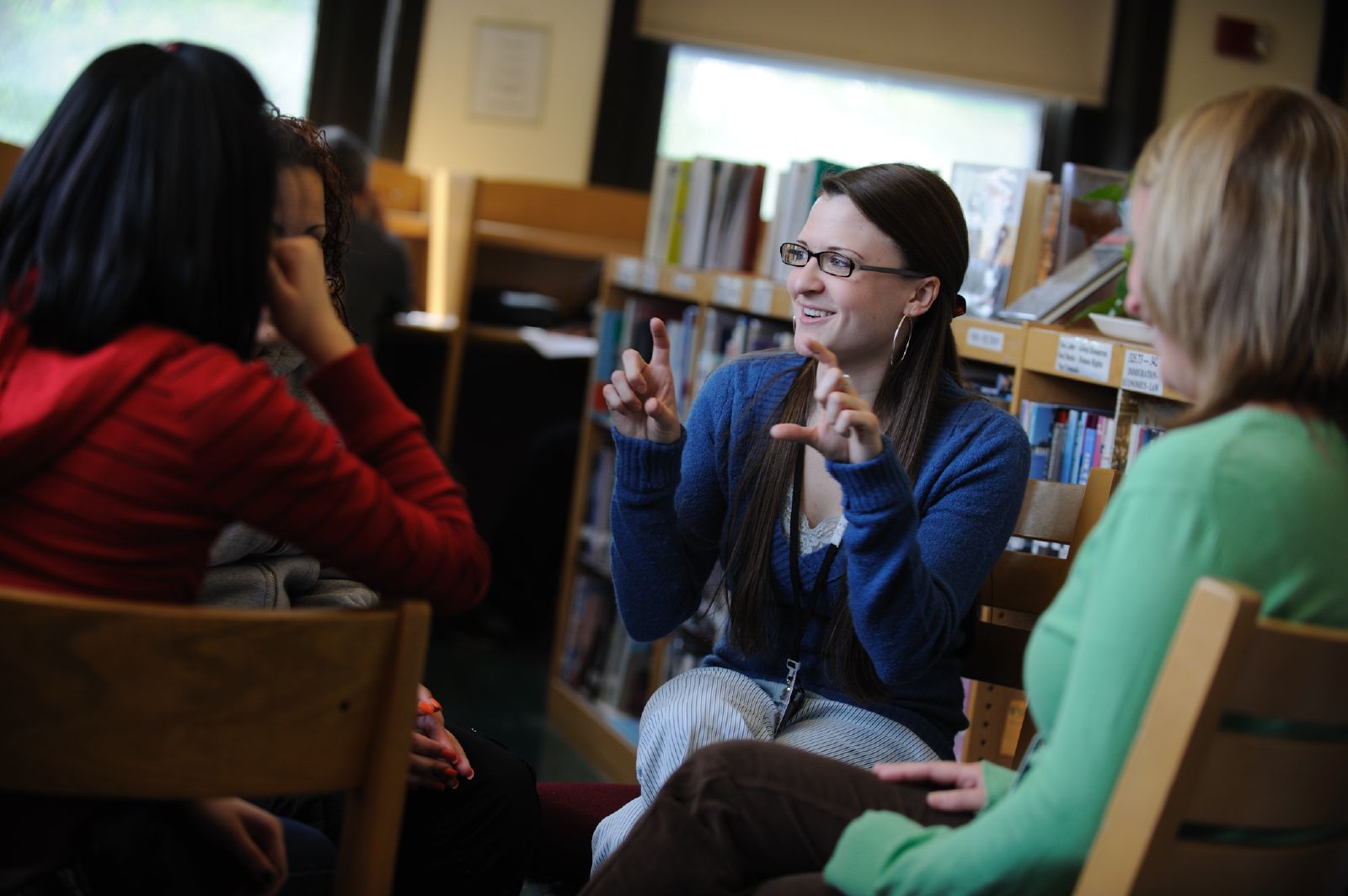
Psychology Department
Learn more about UMass Boston's Psychology department, our research, and our faculty.
Explore the Clinical Psychology PhD Program
Mission statement.
(Revised Spring 2017)
Accredited by the Commission on Accreditation of the American Psychological Association since 1993, University of Massachusetts Boston’s (UMass Boston) program in clinical psychology is based on a scientist-practitioner-activist model. The program prepares clinical psychologists who have an excellent foundation in psychological science and can translate their basic knowledge into practical applications to meet the mental health needs of children, adolescents, and adults from diverse sociocultural groups. Graduates of the program have the requisite skills to advance understanding of key human problems through research, scholarly activities, clinical practice, teaching, professional service, advocacy, and activism.
Our clinical psychology training model is biopsychosocial in its scientific orientation, and places special emphasis on the roles of culture and context in understanding the complexities of multiple dimensions of human behavior and functioning. This emphasis includes, but is not limited to, bringing to the study of clinical psychology an understanding of social justice, equity, oppression, systems of privilege and marginalization, procedural and relational justice, and epistemological and methodological marginalization. This includes a commitment to training a diverse workforce of scientist-practitioner-activist clinical psychologists. Among the many skills students learn in our program, we aim to develop within them a lifelong commitment to using clinical psychology to serve the general population and to meet the needs of marginalized individuals and communities by being culturally humble and responsive researchers, mentors, clinicians, supervisors, teachers, leaders, advocates, activists, and community members. The training in our program results from an affirmative commitment by both faculty and students to engage in ongoing personal reflection and reflection upon the practices in our field—to increase our self-awareness and guide thoughtful psychological practice and relevant social justice actions.
Our educational mission is to train scientist-practitioner-activist clinical psychologists who will:
- Engage in social science research, critical scholarly inquiry, and educational activities including scholarly analysis that specifically address social and structural inequities affecting psychosocial health and functioning, including but not limited to inequities based on social class, race, ethnicity, sexual orientation, gender identity, gender, disability, age, language, citizenship, immigration status, and religion.
- Provide affirming and empowering evidence-based clinical services to people across sociocultural groups and statuses.
- Serve as leaders, role models, and change-makers to promote social justice within their organizations, the profession of psychology, and other contexts. We aim to foster students’ capacity to serve as advocates and activists.
- Apply their developed awareness of how the field of clinical psychology is socially situated, reflect critically on the practices and purposes of our field, and understand how it can privilege or marginalize certain identities and lived experiences, treatment and assessment practices, and epistemological and philosophical positions.
Learning Objectives
To achieve these long term goals for our graduates, we have the following Learning Objectives for their time within our program. Our Learning Objectives line up with the longer term goals for our graduates related to Research (1), Practice (2), and Activism (3) above. The fourth aim above reflects our overall approach to how we approach all aspects of our training. It focuses on applying a reflective practice in critical social justice theory across all aspects of the work. In this way, it does not have specific learning objectives associated with it, but rather it serves as the lens through which we view research, practice, and activism.
Goal 1: To produce graduates who engage in clinical psychology research, critical scholarly inquiry and analysis, and educational activities that specifically address social and structural inequities affecting psychosocial health and functioning.
Objectives for Goal 1:
To provide students with:
- 1.1 Foundational knowledge in the science of psychology with specific attention to training in addressing social and structural inequalities with appropriate conceptual, methodological, and culturally sensitive skills.
- 1.2 The basic skills necessary to become critical consumers of the existing research literature, identifying gaps in the literature and developing the skills to design and implement rigorous research projects.
- 1.3 The skills necessary to evaluate research critically in relation to issues of contextual and cultural diversity and to design and conduct research that helps advance the field in understanding and attending to these issues.
Goal 2: To produce graduates who are knowledgeable about and skilled at providing affirming and empowering evidence-based clinical services to people across sociocultural groups and statuses.
Objectives for Goal 2:
- 2.1. Didactic and clinical training needed to become proficient in testing and assessment theory and practice that is both informed by scientific knowledge and is culturally responsive.
- 2.2 Didactic and clinical training needed to become proficient in a continuum of intervention skills in a manner that is culturally informed and responsive, guided by scientific knowledge, and that considers individual assessment performance in the context of developmental and broader systemic factors.
- 2.3 Introductory level knowledge of competencies in supervision and consultation skills, through exposure to the literature on best practices supervision.
- 2.4 Didactic knowledge and skills to understand, recognize, and address the contextual factors, positionality, and power dynamics inherent in co-constructed therapeutic relationships and embedded in clinical settings.
Goal 3: To produce graduates who have the awareness, knowledge, and skills to serve as leaders, role models, and change-makers to promote social justice within their organizations, the profession of psychology, and other contexts. We aim to foster students’ capacity to serve as advocates and activists.
Objectives for Goal 3:
- 3.1 Didactic experiences to provide foundational awareness, knowledge, and skills to engage in activism within clinical practice and research activities.
- 3.2 Training aimed at fostering growth to apply activist-informed awareness, knowledge, and skills across professional contexts.
Program Description
Our program coursework and training experiences emphasize:
- A biopsychosocial approach. Students learn to conceptualize and treat problems in living by considering not only problem behavior and mental disorders but also by considering the person within their physical, psychological, developmental, and social contexts. Research training gives students skills for analyzing problems from a variety of theoretical perspectives.
- Assessment and psychotherapy skills. The program trains students in a broad range of assessment and intervention skills that enable them to promote healthy adaptation, prevent the development of individual and social problems, and treat problem behavior and mental disorders. We teach students to critically reflect upon our field's use of assessments and clinical approaches and guide students to utilize or create culturally responsive, equitable approaches to serve all their clients.
- Sociocultural context. Within a broad understanding of sociocultural factors, our coursework highlights systemic oppression and privilege, power dynamics, and social and cultural approaches to clinical psychology. We emphasize the ways in which these factors affect individual development across the lifespan, relational interactions, and social groups and dynamics for all people-with a particular emphasis on how marginalized and disadvantaged individuals and groups are impacted. As a foundation for developing this understanding, and the ability to apply it to psychological activities, students reflect upon their own personal cultural situations and positionalities to better understand the experiences of others. They examine and develop skills regarding how to best advocate for their professional values in diverse and complex settings.
- Developmental phenomena in typical and atypical pathways. In our program, students learn about the range of lifespan developmental trajectories from infancy through adulthood. This focus helps to elucidate the ways in which relationships and other environmental factors can support or hinder adaptive or maladaptive development, with the recognition that behaviors which are adaptive in one context may be maladaptive in another. Consistent with our biopsychosocial orientation, students embrace the complexity of developmental processes by taking into consideration the dynamic and transactional interplay of physiological, genetic, social, cognitive, emotional, and cultural influences across time.
- Skills toward practice. Students have the opportunity to take coursework and engage in supervised pre-doctoral clinical training experiences that can be used towards attaining licensure in Massachusetts and many other states.
Program Policies
Policy Statement for Clinical Training
Program Policies Related to Trainees Who Experience Conflicts Working with Diverse Clients (Adapted from the Sample APA Policy Recommendations) (see Handbook)
As articulated in our program policy statement, we are committed to a training process that ensures that graduate students develop the knowledge, skills, and attitudes to work effectively with members of the public who embody intersecting demographics, attitudes, beliefs, and values. In our Counseling Center practica and in the training we provide in our other on- and off-campus practicum courses we are committed to providing an inclusive and welcoming environment for all members of our community. Consistent with this principle, the Counseling Center policy and our policy for on campus practicum experiences require that trainers and trainees do not discriminate on the basis of age, gender, gender identity, race, ethnicity, culture, national origin, religion, sexual orientation, disability, or socioeconomic status in the services provided at the training clinic or practicum site.
In some cases, tensions may arise for a student due to differences in beliefs or values with clients. Because the students will have to navigate these sorts of clinical situations in their future practice careers, the program has a responsibility to prepare students to do so in a safe and ethical manner. The program will respectfully work with students as they learn how to effectively practice with a broad range of clients. Thus, students should expect to be assigned clients that may present challenges for them at some point in training.
If trainees do not feel comfortable or capable of providing competent services to a client because it conflicts with the trainee's beliefs or values, it is the trainee's responsibility to bring this issue to the attention of his/her supervisor. Because client welfare and safety are always the first priority, decisions about client assignment and reassignment are the responsibility of the faculty/supervisors.
Other Policies
You may view our mental health policy as well as our other policies in the clinical handbook.
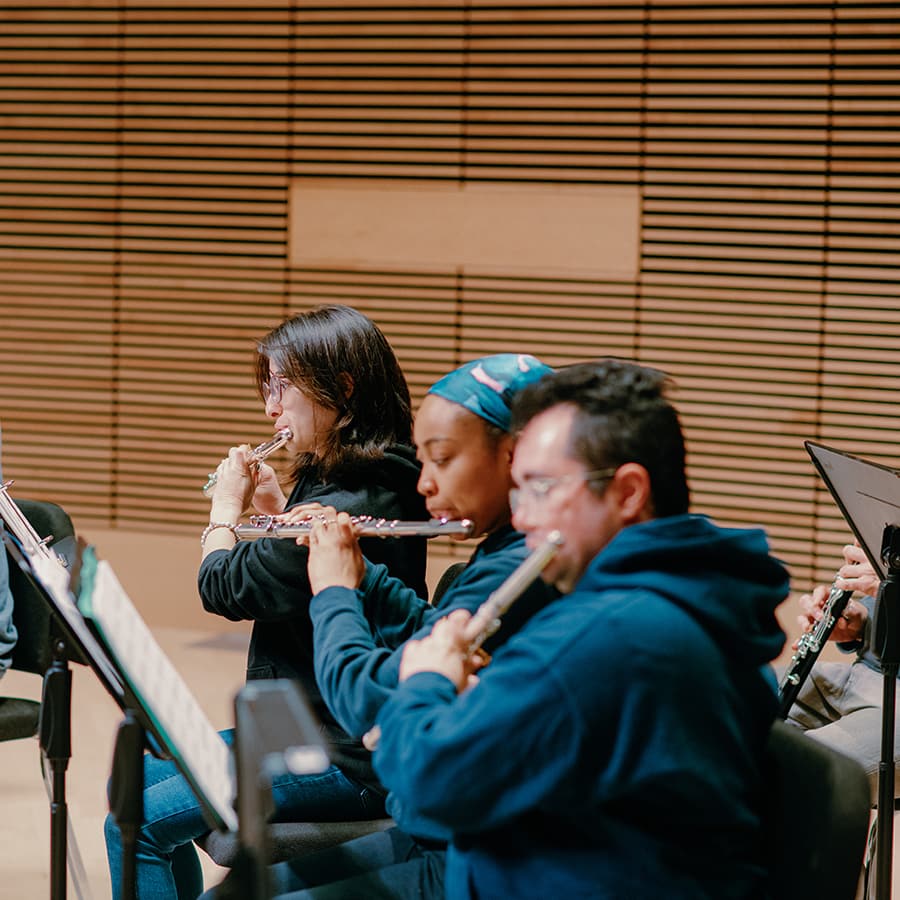
College of Liberal Arts
Learn more about the faculty, research, and programs that make up our College of Liberal Arts.
Student Handbook
Download the Clinical Psychology PhD Handbook .
Student Admissions, Outcomes & Data
Download documentation on our student admissions, outcomes, and other data.
Accreditation Questions
Questions related to the program's accredited status should be directed to the Commission on Accreditation :
Office of Program Consultation and Accreditation American Psychological Association 750 1st Street, NE, Washington, DC 20002 202.336.5979 [email protected]
Health, Brain, and Cognition Lab
Persistence pays: successful applicant to a clinical psychology phd. program tells what it’s like.
In the Voss lab, we have a diverse range of graduate students earning a PhD in either Behavioral and Cognitive Neuroscience, Neuroscience, or like our newest graduate student addition Liam, in Clinical Science. Applying to a PhD program can be incredibly confusing as the process varies depending on the program type and the specific school. For the sake of this post, I will be focusing on the application process to clinical psychology (aka clinical science) programs specifically.
Clinical psychology PhD programs are unique as they can produce individuals who conduct research, practice as a clinician, or do a little bit of both in a multitude of settings. This is unlike a Master’s program where the training is much shorter and allows graduates to practice just as a clinician or requires additional training in a PhD program to be able to conduct research. Further, PsyD programs are similar to PhD programs, however they differ as their primary focus is on clinical practice and typically produce sole clinicians. The combination of training to reach expert levels in both clinical work and research conduction is specific to clinical psychology programs.
Clinical psychology programs are rigorous and commonly last 6 years where 5 years are a combination of classes, clinical work, research, and working on and defending your dissertation. The 6 th year is spent ‘on internship’ where an in-depth clinical training experience, typically at a different institution, takes place. It is common to find clinical psychologists in academic medical centers, hospitals, colleges, or universities, primary or secondary education schools, and private practices. Whether conducting research in a laboratory setting or working with patients in a clinical setting, clinical psychologists typically work in the realm of assessment, diagnosis, and treatment of mental, emotional, and behavioral disorders in a range of individuals (U.S. Bureau of Labor Statistics, 2023).
Each program will provide students with clinical and research training, but each program has its own training model: some schools emphasize research relatively more than clinical training, clinical over research, or have an even split between the two. Deciding where to apply typically depends on one’s career goals. When applying, the applicant technically first must meet the requirements of the program although they are more so applying to a specific lab within the program. The options of where to apply can be limited depending on the application cycle as: 1) the school must have a clinical psychology training program, 2) the lab one is interested in needs to be accepting a student (labs do not take a student every year, typically due to funding), and 3) the lab should ideally fit with the applicant’s prior experiences and/or research interests. In my experience, I have seen clinical programs report receiving anywhere from 300-800 applications. The number of applications a program receives is the cumulative number of applications each lab at the school receives that year. On average, I have seen schools report taking cohort sizes of around 8-12 students. Typically, specific labs say that they receive at least 100 applications and usually have spots for only 1 or 2 students. Averaging these numbers makes a 1.8% chance of being accepted into a program and about a 1% chance of being accepted into a specific lab (this is the number that matters as you have to be accepted into a lab to be in the program).
The application process can be expensive costing anywhere from $30 to more than $100 per application. In my experience, individuals apply to upwards of 8-12 schools but I have heard of individuals applying to as many as 20 schools in a given application cycle. Additionally, with the odds of being admitted into a program being so low, it is typical to not get accepted the first or even second time applying to programs, making repeat applicants common. To be as competitive as possible it is recommended (not required) to have postbaccalaureate research experience. Typically, you need to be in this position long enough to produce independent research projects to present as a poster or an oral presentation at national or international conferences. Additionally, it is common to see individuals with first author publications. Getting these experiences typically takes 2+ years with substantial time dedicated to research.
Filling out applications is not a streamlined process. Each program has its own unique application form. In addition to asking for basic information such as your name, address, schools attended, classes taken, GPA, etc., it is standard for programs to ask for transcripts, 3 letters of recommendation (at least one is expected to be written by the supervisor of a lab you worked in or supervisors from clinical experience), a curriculum vitae, and perhaps the most important piece, the personal statement.
The personal statement is typically 2-3 pages where you explain why you are interested in earning a PhD in clinical psychology, what area of research you’d like to pursue, why you are applying to this particular program and lab, and how your past experiences fit this narrative. This is perhaps the most important part of the application process, and it can take months to come up with a final draft. This statement typically has slightly different requirements per school and certainly needs to be unique to the lab you are applying to. This is an opportunity to convince the lab that you have experiences that relate to their work and offer a unique perspective that wins you an interview. For this reason, it is good to identify programs you are most interested in early, being the summer and the fall before you apply, so that you can reach out to the lab and the program. This ensures the lab you are interested in is taking a student this cycle and to assess your fit.
I personally found it impactful to email early, keep it short by briefly mentioning who I work with, my career goals, the broad scope of my projects, what I hope to do in graduate school in relation to their lab specifically, and find a way to include a fact that will help them remember me! For example, for one of the labs I ended up interviewing with, I mentioned how I am familiar with their work as the Voss Lab modified one of their cognitive computer tasks that I know well as I have administered and scored it.
Typical due dates for clinical psychology applications are either November 15 th or December 1 st . Once materials are submitted, schools will reach out within a month or two. At this point, more and more labs are conducting ‘preliminary interviews’ where you ‘interview’ to get a spot for the official interview day, which can be virtual or in person.
Given you are lucky enough to be offered a spot at one program or a few, it is time to decide if their stipend, program, research, location, etc. will be something you are happy with for at least 5 years. If you do not get any offers, it is time to decide if you want to go through this again and if so, start preparing for next year.
As a multi-time applicant, I believe I made the biggest impact on my application in between the 2022 and 2023 application cycle (the most recent cycle). Everyone’s journey into a PhD program is unique and there is no one correct way to get in, which can be frustrating. In my personal experience the accomplishments that were most positively commented on by interviewers were: my diversified lab experiences, my submitted co-first author paper, giving a presentation at a high-profile conference in my field, submitting my first grant (National Science Foundation- Graduate Research Fellowship Program), and my plethora of experiences with research participants and clinical populations. Lastly, my network of individuals who are currently in PhD programs, are in the field of clinical psychology or related fields, or those who are just great at writing, has grown. Because of this, I was able to receive numerous different perspectives on how to best convey my experiences in a persuasive, clear, and professional way. I cannot thank all of the participants, patients, mentors, friends, and family enough who have supported me in my journey of applying to PhD programs!
Kelsey Baller has recently been accepted into the clinical psychology PhD program at Washington University in St. Louis. A graduate of the University of Iowa with a Bachelor of Science degree in psychology and a minor in Spanish, she has worked as a post-baccalaureate research assistant at the Health, Brain, and Cognition Lab for the past three years.
- History, Facts & Figures
- YSM Dean & Deputy Deans
- YSM Administration
- Department Chairs
- YSM Executive Group
- YSM Board of Permanent Officers
- FAC Documents
- Current FAC Members
- Appointments & Promotions Committees
- Ad Hoc Committees and Working Groups
- Chair Searches
- Leadership Searches
- Organization Charts
- Faculty Demographic Data
- Professionalism Reporting Data
- 2022 Diversity Engagement Survey
- State of the School Archive
- Faculty Climate Survey: YSM Results
- Strategic Planning
- Mission Statement & Process
- Beyond Sterling Hall
- COVID-19 Series Workshops
- Previous Workshops
- Departments & Centers
- Find People
- Biomedical Data Science
- Health Equity
- Inflammation
- Neuroscience
- Global Health
- Diabetes and Metabolism
- Policies & Procedures
- Media Relations
- A to Z YSM Lab Websites
- A-Z Faculty List
- A-Z Staff List
- A to Z Abbreviations
- Dept. Diversity Vice Chairs & Champions
- Dean’s Advisory Council on Lesbian, Gay, Bisexual, Transgender, Queer and Intersex Affairs Website
- Minority Organization for Retention and Expansion Website
- Office for Women in Medicine and Science
- Committee on the Status of Women in Medicine Website
- Director of Scientist Diversity and Inclusion
- Diversity Supplements
- Frequently Asked Questions
- Recruitment
- By Department & Program
- News & Events
- Executive Committee
- Aperture: Women in Medicine
- Self-Reflection
- Portraits of Strength
- Mindful: Mental Health Through Art
- Event Photo Galleries
- Additional Support
- MD-PhD Program
- PA Online Program
- Joint MD Programs
- How to Apply
- Advanced Health Sciences Research
- Clinical Informatics & Data Science
- Clinical Investigation
- Medical Education
- Visiting Student Programs
- Special Programs & Student Opportunities
- Residency & Fellowship Programs
- Center for Med Ed
- Organizational Chart
- Committee Procedural Info (Login Required)
- Faculty Affairs Department Teams
- Recent Appointments & Promotions
- Academic Clinician Track
- Clinician Educator-Scholar Track
- Clinican-Scientist Track
- Investigator Track
- Traditional Track
- Research Ranks
- Instructor/Lecturer
- Social Work Ranks
- Voluntary Ranks
- Adjunct Ranks
- Other Appt Types
- Appointments
- Reappointments
- Transfer of Track
- Term Extensions
- Timeline for A&P Processes
- Interfolio Faculty Search
- Interfolio A&P Processes
- Yale CV Part 1 (CV1)
- Yale CV Part 2 (CV2)
- Samples of Scholarship
- Teaching Evaluations
- Letters of Evaluation
- Dept A&P Narrative
- A&P Voting
- Faculty Affairs Staff Pages
- OAPD Faculty Workshops
- Leadership & Development Seminars
- List of Faculty Mentors
- Incoming Faculty Orientation
- Faculty Onboarding
- Past YSM Award Recipients
- Past PA Award Recipients
- Past YM Award Recipients
- International Award Recipients
- Nominations Calendar
- OAPD Newsletter
- Fostering a Shared Vision of Professionalism
- Academic Integrity
- Addressing Professionalism Concerns
- Consultation Support for Chairs & Section Chiefs
- Policies & Codes of Conduct
- Health & Well-being
- First Fridays
- Fund for Physician-Scientist Mentorship
- Grant Library
- Grant Writing Course
- Mock Study Section
- Research Paper Writing
- Funding Opportunities
- Join Our Voluntary Faculty
- Faculty Resources
- Research by Keyword
- Research by Department
- Research by Global Location
- Translational Research
- Research Cores & Services
- Program for the Promotion of Interdisciplinary Team Science (POINTS)
- CEnR Steering Committee
- Experiential Learning Subcommittee
- Goals & Objectives
- Embryonic Stem Cell Research Oversight
- COVID-19 Vaccinations in CT
- COVID-19 in Connecticut Schools
- Connecticut Towns COVID-19 Impact Dashboard
- Connecticut Town 14-Day Cases Time Lapse
- CT Correctional Facilities with COVID Cases Dashboard
- Connecticut COVID Presence Map
- CT Nursing Homes with COVID-19 Cases
- U.S. COVID Presence Map
- COVID-19 Case Density by US County
- Global Cases Dashboard
- Time-Lapse of Global Spread
- US Racial and Ethnic Disparities in COVID-19 Mortality
- Childcare Survey and Data Display
- Risk of Complications Conditional on COVID-19 Infection
- Travel Time to COVID Testing Sites in Connecticut
- Travel Time to COVID Testing Sites in the US
- Project Team
- Issues List
- Print Magazine PDFs
- Print Newsletter PDFs
- YSM Events Newsletter
- Social Media
- Patient Care
INFORMATION FOR
- Residents & Fellows
- Researchers
Doctoral Internship in Clinical and Community Psychology Matches New Fellows
Yale doctoral internship in clinical and community psychology graduates celebrate.
The results of the national match were announced for psychology internship programs on Feb. 16. Through this process, the Yale Department of Psychiatry's Doctoral Internship in Clinical and Community Psychology selected its incoming class of 14 fellows who will spend a year training at one of nine clinical sites based at the Connecticut Mental Health Center and Yale New Haven Hospital.
Fellows were selected from a large pool of over 300 highly qualified applicants. Donna LaPaglia, PsyD, ABPP, the department's acting director of training, said, These individuals represent the future leaders of the field, I have no doubt that they will make significant contributions to our Yale community and to the field of psychology.”
The success of this year’s match speaks to the faculty and staff investment in the internship recruitment process. Rajita Sinha, PhD, deputy chair of psychiatry for psychology and chief of psychology said, "We have one of the largest Psychology Sections among academic medical centers across the country with stellar psychology faculty involved in this training program. Their efforts have yielded an exceptional internship program that draws the best graduate students from across the country. We look forward to training the next generation of health service psychology leaders.”
Jacob Tebes, PhD, chief of psychology at the Connecticut Mental Health Center, said, “We had another outstanding match this year, one of our best ever. We look forward to welcoming an exceptional group of psychology fellows.”
" We couldn’t be more pleased with the results of this year’s match," said Dwain Fehon, PsyD, chief of psychology at Yale New Haven Hospital. "The pool of applicants was quite competitive, and we were able to match with our top choices. We are truly looking forward to their arrival in July.”
Students typically complete this clinically oriented internship as the final year of a five-year program of graduate study, which leads to a PhD or PsyD. Additional information on the internship is available at www.psychologytraining.yale.edu .
Connecticut Mental Health Center
Yale new haven hospital, featured in this article.
- Donna LaPaglia, PsyD, ABPP Associate Professor of Psychiatry; Director of the Substance Abuse Treatment Unit of the Connecticut Mental Health Center; Associate Director of Addiction Services, the Connecticut Mental Health Center
- Rajita Sinha, PhD Foundations Fund Professor of Psychiatry and Professor in the Child Study Center and of Neuroscience; Deputy Chair of Psychiatry for Psychology, Psychiatry; Director, Yale Interdisciplinary Stress Center; Chief, Psychology Section in Psychiatry
- Jacob Tebes, PhD, BS Professor of Psychiatry (Psychology), in the Child Study Center and of Public Health (Social and Behavioral Sciences); Director, Division of Prevention and Community Research, Department of Psychiatry; Director, The Consultation Center; Chief Psychologist, Connecticut Mental Health Center; Program Director, NIDA T32 Postdoctoral Research Training Program in Substance Abuse Prevention; Director, Elm City COMPASS, Psychiatry
- Dwain Fehon, PsyD Professor of Psychiatry; Chief Psychologist, Psychiatric Services, Yale New Haven Hospital; Director, Behavioral Medicine Service

IOE - Faculty of Education and Society

Study Psychology: Education & Human Development internationally at world #1 institution in education
Develop your knowledge and career in psychology education with the leading centre devoted to developmental psychology and its application in education and other real-world settings.
Applications are now open
Students are advised to apply as early as possible due to competition for places.
Sign up for regular updates about our programmes, events and news
Psychology: education and human development.
- Child Development MSc
- Developmental and Educational Psychology MSc
- Education (Psychology) MA
- Educational Neuroscience MSc/MA
- Psychology of Education MSc
- Psychological Science of Mental Health and Wellbeing in Education MSc
What our students have said about us
The empirical research you get to conduct for the dissertation; the access to resources, materials and sample population makes the research actually worth it. And the constant dedication by the staff, from the administrators to the professors, has been extremely impressive. - Dhanishtha Patel “
World #1 for Education
We have been number one for Education worldwide since 2014 in the QS World University Rankings by Subject.
Engage with globally-influential academics and research centres
Like the Multilanguage and Cognition Lab , formed to understand how multilanguage acquisition can reshape our minds.
Join a diverse and welcoming network
Our students and academics are breaking boundaries and getting involved, from using psychological insights to support young people who have been victims of violence to exploring the psychology of education as an aspiring professor .
Gain the critical thinking and advanced skills to further your career
Learn from experts at the Department of Psychology and Human Development , who are pioneering the fields of educational neuroscience and developmental psychology.
Gecko Form Widget Placeholder 21FO00ics4sh42002tm6b9nbvh
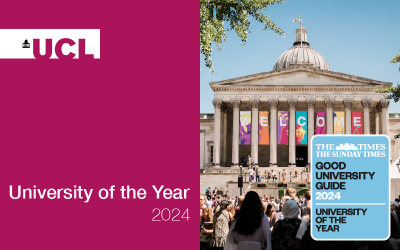
UCL named University of the Year
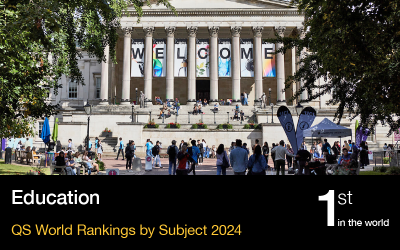
IOE named World Number 1 for Education in QS subject rankings

UCL Scholarships and funding
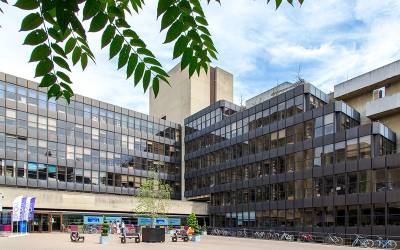
IOE Scholarships and funding

Information for international students interested in studying in London at UCL
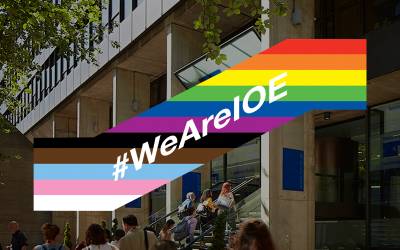
Equity, diversity and inclusion: our commitment
UNC-Chapel Hill graduate programs ranked among best in nation
U.S. News & World Report’s 2024 “Best Graduate Schools” list named multiple Carolina graduate degree programs in the top 10, including UNC Eshelman School of Pharmacy at No. 1.
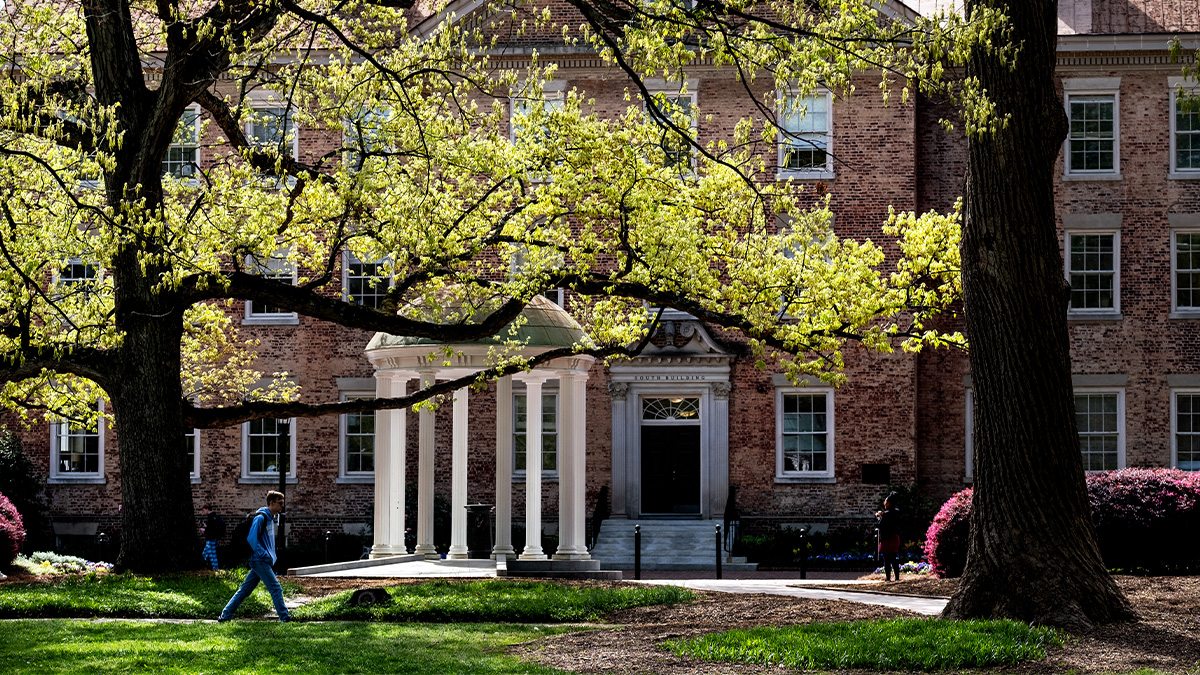
Numerous UNC-Chapel Hill graduate programs received high rankings – 20 were among the top 10 in the nation in their respective categories – as part of U.S. News & World Report’s “Best Graduate Schools” list.
For the third time in a row (2016, 2020 and 2024), UNC Eshelman School of Pharmacy is the top pharmacy school in the U.S. The rankings are based on a survey of peers from accredited pharmacy schools across the country and are published every four years.
The Gillings School of Global Public Health was ranked second out of 213 schools and programs of public health in the U.S. for the seventh consecutive rankings period. The Gillings School has also maintained its position as the top public school of public health and has been ranked among the top schools and programs of public health by U.S. News since the magazine first ranked public health schools in 1987. U.S. News & World Report does not rank all graduate programs each year.
“Carolina’s graduate programs are exceptional, and it’s no surprise that our schools are ranked so highly among peer institutions by U.S. News and World Report, as well as other measures,” said UNC-Chapel Hill Interim Chancellor Lee H. Roberts. “Carolina is always proud to be recognized for our dedication to a world-class education. Every one of our graduate programs contributes to making us the leading public research university.”
Altogether, 23 programs increased their rankings, including multiple programs in the Gillings School of Global Public Health, School of Nursing, School of Education, Kenan-Flagler Business School and UNC School of Law.
“These rankings represent the hard work of our faculty, staff and students who are dedicated to moving Carolina forward through their incredible efforts each day,” said UNC-Chapel Hill Provost Chris Clemens. “It is gratifying to see this public recognition of their commitment to the mission of our graduate programs in research, teaching and public service. Even more than in the rankings, the proof of their work is the quality of our students and our passionate alumni who lead in so many fields.”
The School of Social Work moved up three spots in the latest rankings to a tie for fourth overall and is tied for second among public universities.
This year marks the first time since U.S. News & World Report began ranking law schools in 1987 that UNC School of Law has reached No. 20 out of 196 law schools. The UNC School of Law is also the seventh-ranked public law school.
Additional UNC-Chapel Hill rankings for 2024 follow.
Please note: Not all graduate programs are ranked by U.S. News & World Report every year. For a complete list of rankings for UNC-Chapel Hill, visit the U.S. News & World Report website .
UNC Eshelman School of Pharmacy
Gillings school of global public health.
- First public, second overall
Specialty Areas
- Health Behavior, second
- Biostatistics, third
- Epidemiology, third
- Health Policy and Management, fourth
- Environmental Health Science, eighth
School of Social Work
- Tied for fourth
School of Nursing
- Nursing Schools, Master’s Programs, tied for eighth
- Nursing Schools – DNP Programs, tied for 17th
- Nursing Master’s, Administration/Management, fourth
- Nursing Master’s, Nurse Practitioner: Psychiatric/Mental Health, fourth
- Nursing Master’s, Nurse Practitioner: Family, tied for sixth
- Nursing DNP, Psychiatric/Mental Health, third
- Nursing DNP, Family, tied for sixth
UNC Kenan-Flagler Business School
- Tied for 20th
- Real Estate, ninth
- Accounting, tied for 13th
- Executive MBA, 14th
- Management, 16th
- Production Operations, 16th
- Finance, 20th
- Marketing, tied for 25th
UNC School of Education
- Tied for 25th
- Special Education, tied for 13th
- Elementary Teacher Education, tied for 14th
- Educational Psychology, tied for 15th
- Education Policy, tied for 16th
- Secondary Teacher Education, tied for 17th
- Educational Administration, tied for 17th
- Curriculum and Instruction, tied for 22nd
College of Arts and Sciences
Computer science.
- Overall, 27th
Public Affairs
- Overall, 39th (Master of Public Policy)
As part of the public affairs category, U.S. News and World Report ranked Carolina programs and specialty areas based in the School of Government and the College of Arts and Sciences’ department of public policy.
School of Government
- Public Affairs, 23rd (Master of Public Administration)
- Local Government Management, second
- Leadership, 10th
- Public Finance, 18th
UNC School of Law
- Legal Writing, tied for 20th
- Criminal Law, tied for 20th
- Tax Law, tied for 20th
- Business/Corporate Law, tied for 22nd
- Clinical Training, tied for 23rd
- Contracts/Commercial Law, 23rd
- Health Care Law, tied for 28th
- Constitutional Law, tied for 29th
- Environmental Law, tied for 45th
- International Law, tied for 52nd
- Intellectual Property Law, tied for 53rd
- Trial Advocacy, tied for 118th
UNC School of Medicine (additional Rankings will be available at a later date)
- Audiology, tied for third
- Occupational Therapy, fifth
- Physical Therapy, 11th
- Speech Language Pathology, 12th
School of Education students networked in Raleigh with representatives from 11 state agencies.
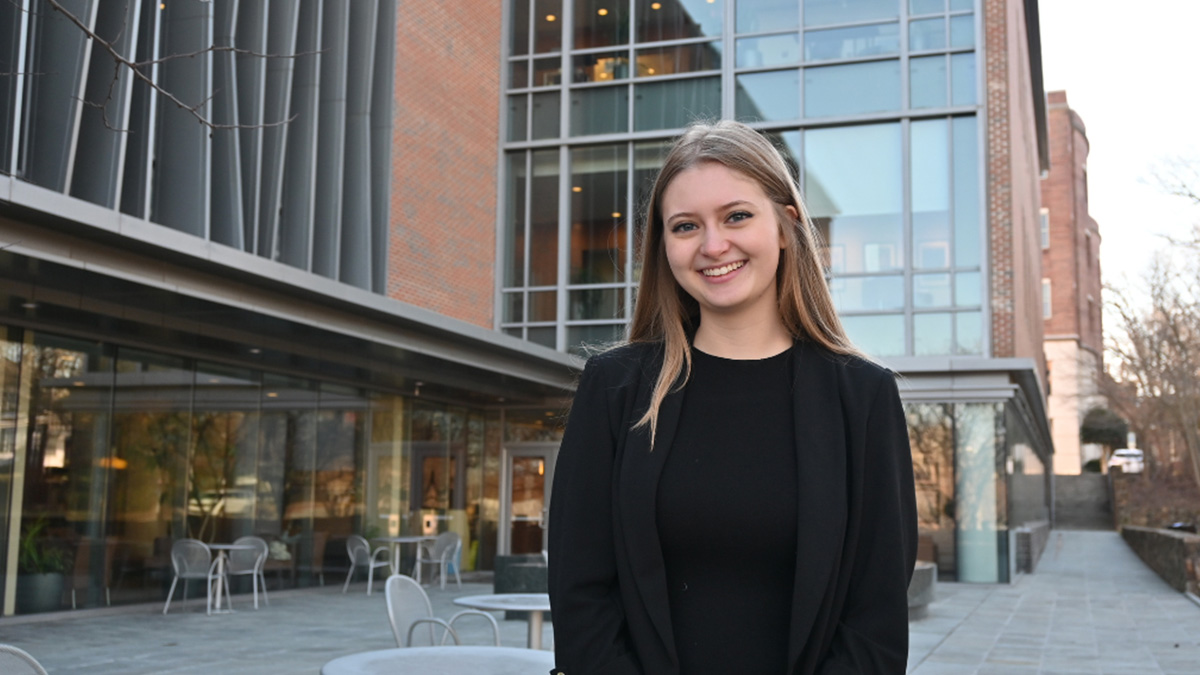
Global studies scholar aspires to diplomacy
After earning a master’s degree, Kat Goodpaster became assistant director of Carolina’s Russian Flagship Program.
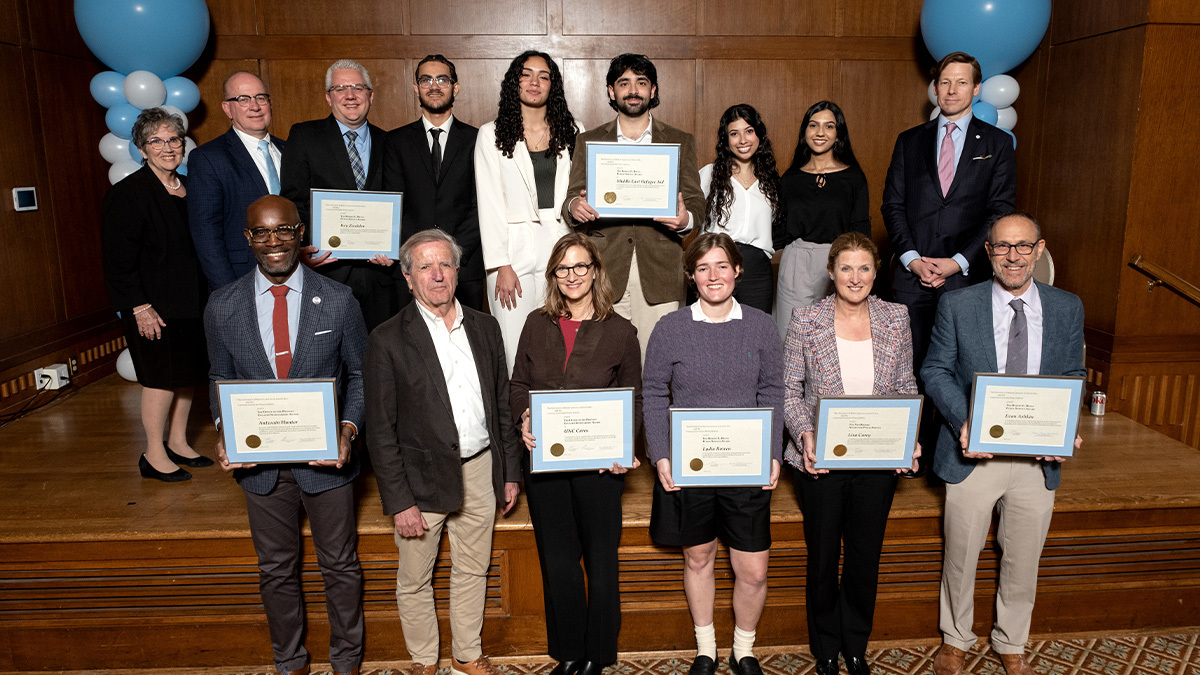
Public Service Awards go to 7 people, 2 groups
The Carolina Center for Public Service honored work on health disparities, refugee aid and more.

Broadway writer brings new comedy to PlayMakers
Fresh off the debut of her musical adaptation of “The Notebook,” Bekah Brunstetter ’04 will debut “The Game” in Chapel Hill.

Arts Everywhere Day set for April 12
The eighth annual campus-wide event celebrates artists creating in all mediums.

Are you ready to run, hide and fight/defend?
Active Shooter and Critical Incident Response training customizes emergency preparedness to your workspace.

EcoStudio matches Tar Heels with internships
Since 2018, the program has helped 466 students explore careers in environment and sustainability.

Morrison Art Studio provides place to create
In this video, learn how one student uses this residence hall space to pursue her passion outside the classroom.
Share on Mastodon
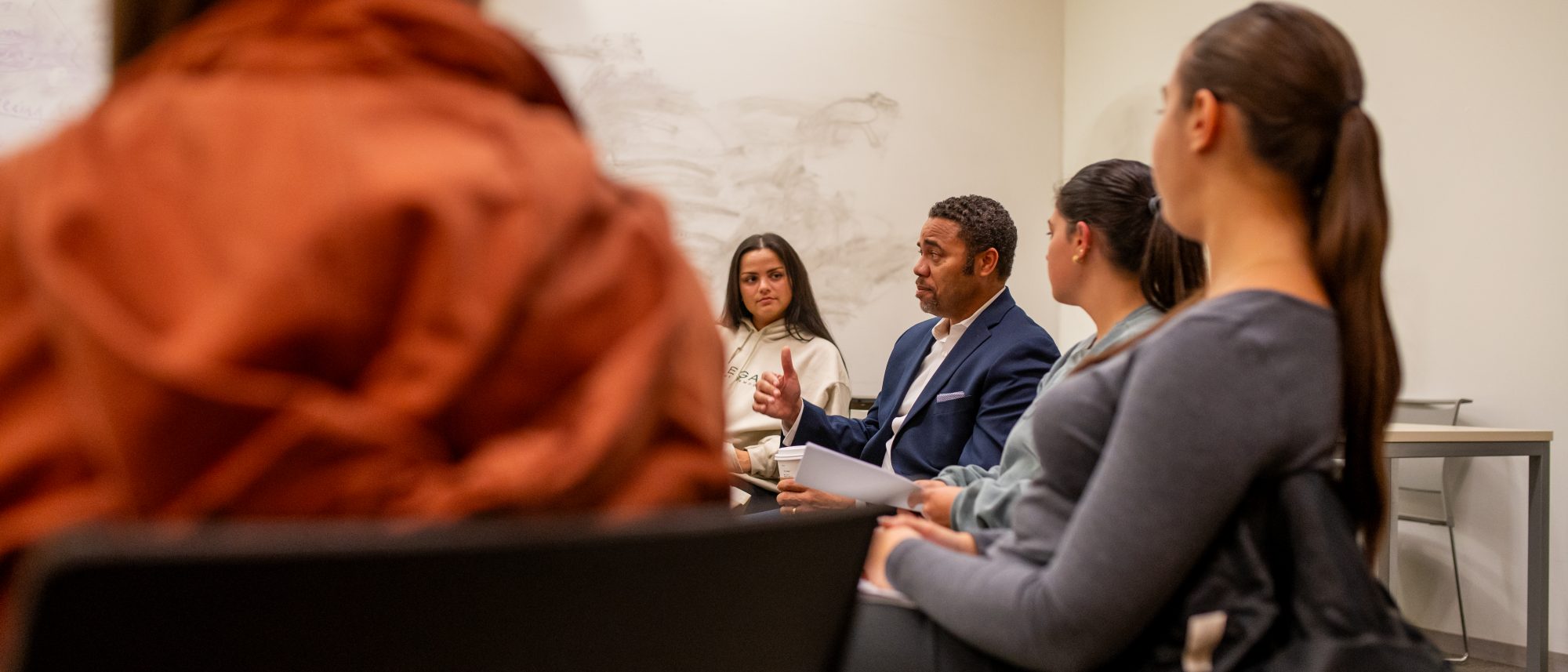
Master’s Study in Psychology
Develop the understanding, professional skills and empathetic approaches that are critical for success in psychology with a master’s degree in psychology from Adelphi University in New York.
Three Degree Options
Choose from MA programs in general psychology, mental health counseling, and school psychology. Each offers optional specializations and valuable field placements.

Making Your Degree Affordable
Adelphi and the Derner School of Psychology offer many ways to help you pay for master’s study, including graduate merit scholarships, scholarships for master’s psychology students, teaching assistantships and even employer tuition reimbursement.
A master’s degree in psychology opens doors to a wide variety of careers and can serve as a pathway to a doctorate.
Derner’s master’s in psychology programs give you the knowledge, training, critical reasoning skills and cultural competence you’ll need to excel in your career. Each includes optional specializations to help you focus on your interests:
- General Psychology: Human Resource Management, Substance Abuse Counseling
- Mental Health Counseling: Global Mental Health, Substance Abuse Counseling
- School Psychology: Bilingual School Psychology, Autism Specialization
Our rigorous master’s programs also offer part-time options and flexible schedules to meet our students’ work or family responsibilities.
Graduate Psychology Programs
Exceptional hands-on training.
As a master’s student at the Derner School of Psychology, you’ll gain clinical skills through practica and internships in local healthcare settings, schools, agencies and organizations, and community services offered by Adelphi. You can also gain valuable experience—and earn money to help cover tuition—in graduate assistantships.
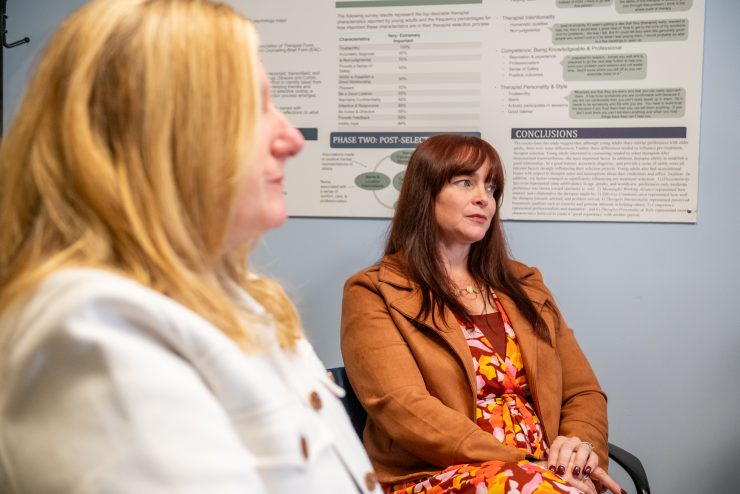
Field Placements
Field experience is a vital part of our master’s degree programs, helping you develop the professional skills and the cultural competence to thrive in any working environment.
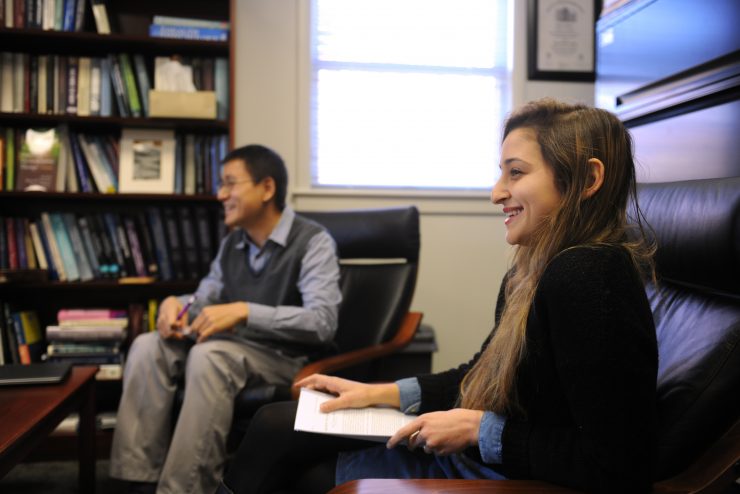
Graduate Assistantships
Working with faculty, staff and students helps cover the cost of your graduate education. Choose from research, testing or departmental assistantships.
“A number of professors in this program have made a profound impact on my development. The coursework, practica and internship experiences helped prepare me to obtain a job prior to graduation.

Mentoring Future Psychologists
- Our Inclusive Community
- Apply to the Program
Awards & Recognition
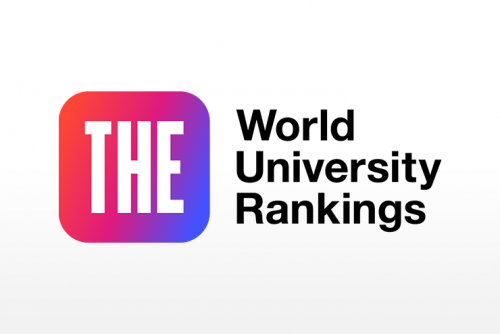
Earn Your Master’s Degree at the Derner School of Psychology
Graduate program contacts.
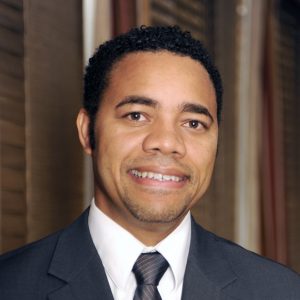
- [email protected]
- 516.237.8572
- 516.877.4754
- Hy Weinberg Center 320

- [email protected]
- 516.877.4743
- Hy Weinberg Center 311
- Current Students
- Parents & Families
- Alumni & Friends
- Local Community
- Student Profile
- Apply for Aid
- Billing
- Loans
- One-Stop Student Services
- Pay Your Bill
- Refunds
- Scholarships & Grants
- Tuition & Costs
- Tuition Insurance
- Add/Drop a Course
- Change Major/Minor
- Course Search
- Degree Audit
- Enrollment/Degree Verification
- Forms & Guidance
- Register for Classes
- University Bulletin (Course Catalog)
- Academic Calendar
- Academic Petitions
- Academic Resources
- Advisement
- Final Exams
- General Education
- Grading Policies
- International Services
- Learning & Writing Centers (Tutoring)
- Mentoring
- Study Abroad
- Assistive Technology
- Bridges to Adelphi (Neurodiversity)
- Housing Accommodations (Section 504)
- Learning Disability & ADHD Support
- Student Access Office
- Athletics (Adelphi Panthers)
- Bookstore
- Clubs & Activities (MyAULife)
- Commuter Student Services
- The Delphian (Student Newspaper)
- Diversity, Equity, Inclusion & Belonging
- Dining Services & Meal Plans
- Interfaith Worship
- Locker Rentals
- Lost & Found
- Multicultural Center
- Residential Life & Housing
- Student & Community Engagement
- Career & Professional Development
- Internships
- Job Search (Handshake)
- Leadership & Development
- On-Campus Jobs
- Prep for Success (Kaplan Career Core)
- Care Team
- Community Concerns & Resolution
- Conduct & Community Standards
- Report Harassment
- Title IX
- Apply to Graduate
- Commencement
- Health Insurance & Waiver
- Health Portal
- Health Services Center
- Immunization Requirements
- Infectious Disease Prevention (COVID-19)
- Mental Health Counseling & Support
- Mindfulness Center
- Nutritionist/Dietitian
- Panther Pantry & Food Insecurity
- Recreation & Fitness
- University Libraries
- My Library Account
- Library Services
- Clery Act
- Emergency Notifications (RAVE)
- Parking
- Report Suspicious Behavior (BIT Team)
- Shuttle Schedule
- Help Desk (Tech Support)
- Linkedin Learning
- Technology Services
- Disclosures & Info
- Student Consumer Info
- Student Disclosure
- Academic Catalog
- Financial Scholarly Support
- Curriculog
- Library
- Navigate
- OARAA
- Provost
- Research & Sponsored Programs
- Administrative Calendar
- Alice Brown Early Learning Center (Childcare)
- Brand & Style Guide
- Community Discounts
- Emergency Notification (RAVE)
- Faculty Payroll & Course Load
- Faculty Senate
- FCPE
- Human Resources
- LinkedIn Learning
- Paid Time-Off
- Public Safety & Transportation
- Technology
- Share Your News or Story
- University News
- University Events
- Administrative Calendar
- Accounts Payable
- Benefits
- Concerns and Resolutions
- Contracts
- Handshake / Post Jobs
- Staff Council
- Parents & Families Info
- Career Services
- High School Programs
- Tuition & Financial Aid
- FERPA
- General Education Requirements
- Registrar
- Paying a Bill
- Accessibility Office
- Availability of Employees
- Campus Map
- Handbooks & Brochures
- Health Services
- Parents & Families Association
- Athletics
- Performing Arts Center
- Adelphi Gold
- Discounts & Benefits
- Jobs at Adelphi
- Networking
- Order a Transcript
- Performing Arts Center
- Camps
- High School Programs
- Pre-College Programs
- Art Exhibitions
- Adult Fitness Program
- Gym Membership
- Continuing Education & Professional Development
- Community Auditing Program
- Credit for Prior Learning
- Breast Cancer Hotline & Support Program
- Hy Weinberg Center for Communication Disorders
- Institute for Parenting
- Literacy Center
- Mental Health Services
- Social Training Center
- Become a Mentor
- Center for Nonprofit Leadership
- Reserve Event Space
You are now leaving the Adelphi University website...
Adelphi is not responsible for the content of third-party sites. External sites may have different Privacy and Security policies than Adelphi University. You should review the policies of any third-party website before you provide personal or confidential information.
Go back Continue
Combined Degrees Psychology/Clinical Mental Health Counseling
- Request Information
- Majors & Degrees
Save on tuition and fast-track to a Clinical Mental Health Counseling master’s degree through JWU’s combined B.S. Psychology/M.S. Clinical Mental Health Counseling program.
If you apply and qualify* for this unique option, you’ll be able to enroll in 4 core counseling graduate courses that will count toward your Psychology bachelor’s degree.
Receive your bachelor’s degree in Psychology and master’s degree in Clinical Mental Health Counseling and start working toward your professional licensure a full semester ahead of schedule.
Note for Charlotte Students
Charlotte students only need to transfer to Providence after they have completed their senior year and are ready to start full time as graduate students. The 4 Grad courses offered as part of this accelerated program will be offered synchronously to both Charlotte and Providence students over Zoom.
* Students must satisfy separate admission requirements for both undergraduate and graduate programs. Admission to the undergraduate program does not guarantee admission to the graduate program.
Explore the full JWU Catalog course listing for the M.S. program:
Clinical Mental Health Counseling
Explore the JWU Catalog course listing for the combined B.S./M.S.:
Combined B.S./M.S.
Faculty Contacts
Jonathan Mosko, Ph.D. 401-598-1425 Email
Howard Slutzky, Psy.D. 980-598-3224 Email

- Request information
- Start your application
30 Best universities for Psychology in Moscow, Russia
Updated: February 29, 2024
- Art & Design
- Computer Science
- Engineering
- Environmental Science
- Liberal Arts & Social Sciences
- Mathematics
Below is a list of best universities in Moscow ranked based on their research performance in Psychology. A graph of 406K citations received by 66.7K academic papers made by 30 universities in Moscow was used to calculate publications' ratings, which then were adjusted for release dates and added to final scores.
We don't distinguish between undergraduate and graduate programs nor do we adjust for current majors offered. You can find information about granted degrees on a university page but always double-check with the university website.
1. Moscow State University
For Psychology

2. National Research University Higher School of Economics

3. Moscow Medical Academy

4. Russian National Research Medical University

5. RUDN University

6. Moscow Institute of Physics and Technology

7. National Research Nuclear University MEPI

8. Russian Presidential Academy of National Economy and Public Administration

9. Moscow State Pedagogical University

10. Finance Academy under the Government of the Russian Federation

11. Bauman Moscow State Technical University

12. Moscow State Institute of International Relations

13. N.R.U. Moscow Power Engineering Institute

14. Moscow Aviation Institute

15. Plekhanov Russian University of Economics

16. Russian State University for the Humanities

17. State University of Management

18. Russian State Social University

19. National University of Science and Technology "MISIS"

20. Moscow State Linguistic University

21. New Economic School

22. Russian State University of Oil and Gas
23. mendeleev university of chemical technology of russia.

24. Moscow Polytech

25. Moscow State University of Railway Engineering

26. National Research University of Electronic Technology

27. Moscow State Technological University "Stankin"

28. Pushkin State Russian Language Institute
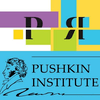
29. Russian State Agricultural University

30. Moscow International University

Universities for Psychology near Moscow
Psychology subfields in moscow.

IMAGES
VIDEO
COMMENTS
Clinical Psychology Ph.D. Program. The Clinical Psychology Program, accredited by the American Psychological Association, is designed to develop competent psychologists who can function in applied, academic, and/or research positions. Our graduates have pursued career paths in clinical research, clinical work and teaching, and all possible ...
Clinical psychology training programs in Canada recognize their shared responsibility to Indigenous peoples. The admissions process for entry into the Clinical and Clinical Developmental Programs at York University is committed to responding to the Truth and Reconciliation Commission of Canada: Calls to Action. ... Our Graduate Program in ...
Our developmental psychology PhD program is world-renowned and consistently ranked as the #1 developmental psychology graduate program in the nation. We offer two tracks tailored to your interests and you'll be part of a community that will support your development as an academic and researcher. Blend research and clinical practice.
In a developmental psychology Ph.D. program, students undertake research and in-depth dissertation studies in addition to completing hands-on practicum work and internships. Graduates may work in clinical settings, research centers, or universities. Ph.D. admissions are rigorous, and many programs admit only a handful of applicants.
The goal of this program is to train students to conduct meaningful and clinically-informed research on issues pertaining to child development and family functioning in clinical or at-risk populations. The program includes a thorough grounding in the theories and methods of both clinical and developmental psychology, including practicum and ...
Div. 7's goal in making this information available is to assist prospective graduate students in identifying those programs which are best suited to their pursuit of research and applied professional work related to human development. Those who are interested in pursuing graduate work in developmental psychology and related disciplines are ...
Upon graduation, you'll be prepared for careers in research, higher education, or clinical developmental psychology. The U of M Graduate School provides programs, resources, and events to help you with every step along the way—from identifying potential career paths, to developing skills to compete for them, to managing your career.. ICD alumni are leaders in the field of developmental ...
The clinical psychology program is also recognized by the Society for Community Research and Action as a doctoral clinical-community training program. Clinical Training. To build real-world clinical experience, students in the PhD program complete a minimum of two assessment practica and two therapy practica in the Meltzer Psychological and ...
The Developmental Psychology Graduate Program at UCLA is research intensive. Our research examines human development from infancy to young adulthood using a variety of laboratory and naturalistic techniques. The goal of the program is to produce independent scholars, and incoming students are expected to become research-active quickly upon ...
The Clinical Psychology Program adheres to a clinical science model of training, and is a member of the Academy of Psychological Clinical Science. ... (e.g., human development) in the Developmental Psychopathology seminar and in the twice-monthly clinical psychology "brown bag" speaker series. ... Graduate School of Arts and Sciences may ...
The Clinical Psychology Program adheres to a clinical science model of training, and is a member of the Academy of Psychological Clinical Science. ... (e.g., human development) in the Developmental Psychopathology seminar and in the twice-monthly clinical psychology "brown bag" speaker series. ... Graduate School of Arts and Sciences may ...
In addition, there are specific course and program requirement. For more details see the Psychology Graduate Handbook (PDF). University of Rochester. Meliora Hall. P.O. Box 270266. Rochester, NY 14627. (585) 273-3264. Our developmental psychology PhD program prepares students for careers that combine research and teaching at the college or ...
Graduate. Ph.D. in Developmental Psychology. Graduate students trained in Cognitive, Developmental, Social, or Quantitative Psychology follow a single curriculum with a uniform set of requirements, but their research programs and seminar courses focus on their unique areas of interest. Our philosophy can be summed up as cooperative, and the ...
We offer a Ph.D. program in Psychology that is designed to provide students with the knowledge, skills, and judgement needed to become active contributors at the highest-level to research, teach, and provide public and professional service in the community. Training is offered in six sub-fields: Behavioral and Integrative Neuroscience, Clinical ...
The Graduate Program in Clinical Psychology at UCLA has been accredited by the American Psychological Association Commission on Accreditation since 1949. (Office of Program Consultation and Accreditation, American Psychological Association, 750 First Street NE. Washington, DC 20002-4242. Telephone: 202-336-5979 .)
Clinical Psychology (PhD) Offered by the Department of Psychology , College of Arts and Sciences , the Clinical Psychology (PhD) program is fully accredited by the American Psychological Association Committee on Accreditation (COA) and has been accredited since 1972. COA is part of the Office of Program Consultation and Accreditation (OPCA).
The primary goal of the Clinical/Developmental training program is to provide graduate students in Psychology with training in the area of developmental psychopathology. Developmental psychopathology is concerned with the origins and progression of patterns of adaptive and maladaptive behavior across the lifespan.
The PhD program in Developmental and Brain Sciences (DBS) at the University of Massachusetts Boston is a research-intensive program focused on understanding cognition, perception, and behavior when underlying neural and hormonal mechanisms are developing. Core faculty engage in lab work ranging from cognitive development and psychophysics to ...
UCCS is home to more than 12,000 driven students and over 800 experienced faculty members. Choose from more than 100 options within 50 undergraduate, 24 graduate, and seven doctoral degrees. Take a virtual tour and explore programs and opportunities to support you in your college-decision journey.
PhD candidates have up to nine years to complete their doctoral degree requirements. With the foundation you build while earning a PhD in Clinical Psychology, can help meet the growing need for psychologists in the United States. 1 Earn your degree in a program that helps you use your knowledge and skills to improve the quality of mental health ...
The Clinical Psychology PhD Program at UMass Boston uses a clinical research apprenticeship model. Each first-year graduate student apprentices with a clinical faculty member who will serve as research mentor and advisor to the graduate student. For more information, please reference our summary of Clinical Psychology PhD 2024-2025 Faculty Mentors.
Clinical psychology PhD programs are unique as they can produce individuals who conduct research, practice as a clinician, or do a little bit of both in a multitude of settings. This is unlike a Master's program where the training is much shorter and allows graduates to practice just as a clinician or requires additional training in a PhD ...
The results of the national match were announced for psychology internship programs on Feb. 16. Through this process, the Yale Department of Psychiatry's Doctoral Internship in Clinical and Community Psychology selected its incoming class of 14 fellows who will spend a year training at one of nine clinical sites based at the Connecticut Mental Health Center and Yale New Haven Hospital.
Biography. Dr. Elena L. Grigorenko received a Ph.D. in General Psychology and a Ph.D. in Behavior Genetics and her Habilitation in Pedagogical Psychology from Moscow State University, Russia, her Ph.D.'s in Developmental Psychology and Genetics from Yale University, U.S.A., and her Clinical (Forensic) Psychology Ph.D. from Fielding University, USA.
Develop your knowledge and career in psychology education with the leading centre devoted to developmental psychology and its application in education and other real-world settings. Study Psychology: Education & Human Development internationally at world #1 institution in education | IOE - Faculty of Education and Society - UCL - University ...
University News. UNC-Chapel Hill graduate programs ranked among best in nation. U.S. News & World Report's 2024 "Best Graduate Schools" list named multiple Carolina graduate degree programs in the top 10, including UNC Eshelman School of Pharmacy at No. 1. By University Communications,Tuesday, April 9th, 2024.
Faculty. A master's degree in psychology opens doors to a wide variety of careers and can serve as a pathway to a doctorate. Derner's master's in psychology programs give you the knowledge, training, critical reasoning skills and cultural competence you'll need to excel in your career. Each includes optional specializations to help you ...
We are delighted to announce that Benjamin Handen, PhD, has received conferral of tenure at the rank of professor by the University of Pittsburgh. Dr. Handen is an internationally recognized leader in the study of autism and other intellectual and developmental disabilities. His early work focused on investigating the safety and efficacy of stimulant medication to treat attention-deficit ...
Save on tuition and fast-track to a Clinical Mental Health Counseling master's degree through JWU's combined B.S. Psychology/M.S. Clinical Mental Health Counseling program.. If you apply and qualify* for this unique option, you'll be able to enroll in 4 core counseling graduate courses that will count toward your Psychology bachelor's degree.
Moscow 30. Saint Petersburg 17. Omsk 6. Tomsk 6. Ranking methodology. Below is the list of 30 best universities for Psychology in Moscow, Russia ranked based on their research performance: a graph of 406K citations received by 66.7K academic papers made by these universities was used to calculate ratings and create the top.